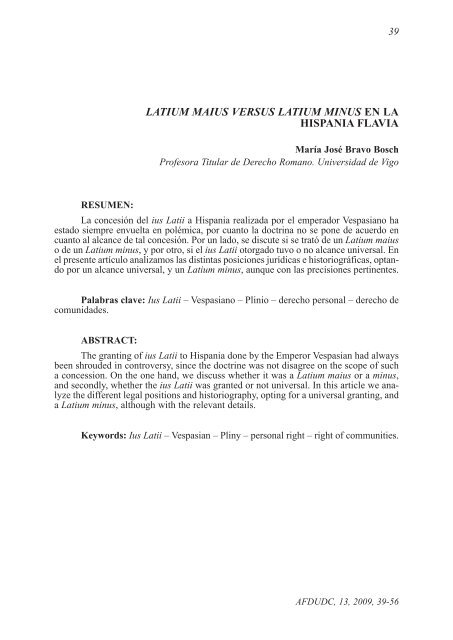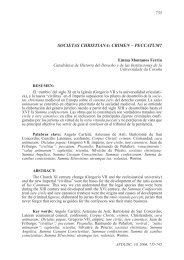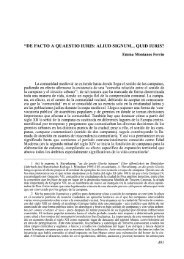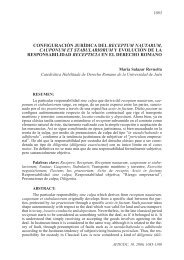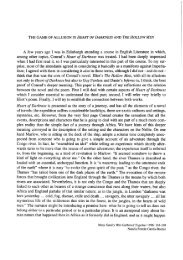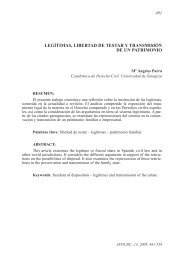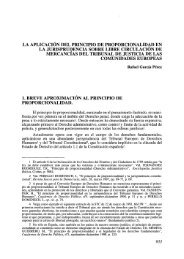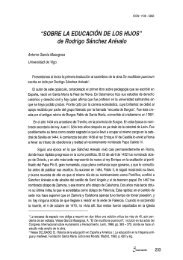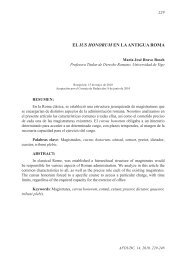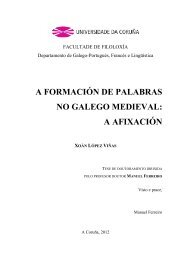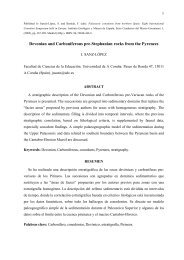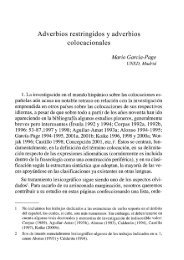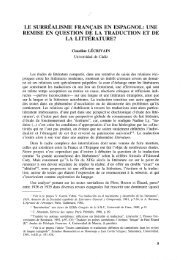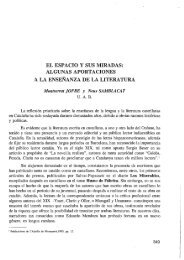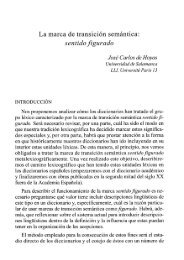Latium Maius versus Latiun Minus en la Hispania Flavia - RUC
Latium Maius versus Latiun Minus en la Hispania Flavia - RUC
Latium Maius versus Latiun Minus en la Hispania Flavia - RUC
Create successful ePaper yourself
Turn your PDF publications into a flip-book with our unique Google optimized e-Paper software.
LATIUM MAIUS VERSUS LATIUM MINUS EN LA<br />
HISPANIA FLAVIA<br />
María José Bravo Bosch<br />
Profesora Titu<strong>la</strong>r de Derecho Romano. Universidad de Vigo<br />
RESUMEN:<br />
La concesión del ius Latii a <strong>Hispania</strong> realizada por el emperador Vespasiano ha<br />
estado siempre <strong>en</strong>vuelta <strong>en</strong> polémica, por cuanto <strong>la</strong> doctrina no se pone de acuerdo <strong>en</strong><br />
cuanto al alcance de tal concesión. Por un <strong>la</strong>do, se discute si se trató de un <strong>Latium</strong> maius<br />
o de un <strong>Latium</strong> minus, y por otro, si el ius Latii otorgado tuvo o no alcance universal. En<br />
el pres<strong>en</strong>te artículo analizamos <strong>la</strong>s distintas posiciones jurídicas e historiográficas, optando<br />
por un alcance universal, y un <strong>Latium</strong> minus, aunque con <strong>la</strong>s precisiones pertin<strong>en</strong>tes.<br />
Pa<strong>la</strong>bras c<strong>la</strong>ve: Ius Latii – Vespasiano – Plinio – derecho personal – derecho de<br />
comunidades.<br />
ABSTRACT:<br />
The granting of ius Latii to <strong>Hispania</strong> done by the Emperor Vespasian had always<br />
be<strong>en</strong> shrouded in controversy, since the doctrine was not disagree on the scope of such<br />
a concession. On the one hand, we discuss whether it was a <strong>Latium</strong> maius or a minus,<br />
and secondly, whether the ius Latii was granted or not universal. In this article we analyze<br />
the differ<strong>en</strong>t legal positions and historiography, opting for a universal granting, and<br />
a <strong>Latium</strong> minus, although with the relevant details.<br />
Keywords: Ius Latii – Vespasian – Pliny – personal right – right of communities.<br />
39<br />
AFDUDC, 13, 2009, 39-56
1. STATUS QUAESTIONIS<br />
<strong>Latium</strong> maius <strong>versus</strong> <strong>Latium</strong> minus <strong>en</strong> <strong>la</strong> <strong>Hispania</strong> F<strong>la</strong>via.<br />
En cualquier análisis que se realice de <strong>la</strong> <strong>Hispania</strong> romana, ocupa un lugar destacado<br />
el mom<strong>en</strong>to histórico <strong>en</strong> el que se produce un acto jurídico de <strong>en</strong>orme importancia<br />
para el futuro de <strong>Hispania</strong> como integrante del Estado Romano, el otorgami<strong>en</strong>to<br />
del Ius Latii. Después de un período <strong>la</strong>rgo de sometimi<strong>en</strong>to de los territorios hispanos<br />
al poder del Imperio romano, se hizo necesario otorgar medidas que ayudas<strong>en</strong> a <strong>la</strong> integración<br />
jurídica de <strong>Hispania</strong> de una forma equilibrada. Sin duda, <strong>la</strong> concesión del<br />
<strong>Latium</strong> a <strong>Hispania</strong> que se produce <strong>en</strong> el siglo I d.C. durante el reinado del primero de<br />
los F<strong>la</strong>vios, va a suponer un impulso de consecu<strong>en</strong>cias únicas y muy positivas para un<br />
territorio difícil de conquistar y todavía más complejo <strong>en</strong> lo que a su administración se<br />
refiere, todo ello debido a <strong>la</strong> singu<strong>la</strong>r idiosincrasia de <strong>la</strong>s distintas comunidades indíg<strong>en</strong>as<br />
exist<strong>en</strong>tes <strong>en</strong> suelo hispano, y al difer<strong>en</strong>te grado de romanización de <strong>la</strong>s mismas. Por<br />
todo ello, adquiere especial relevancia <strong>la</strong> figura del emperador Vespasiano1 –primero de<br />
los F<strong>la</strong>vios- que fue el que concedió el ius Latii a <strong>la</strong>s tres <strong>Hispania</strong>s, una medida excepcional<br />
por su alcance, de cuya singu<strong>la</strong>ridad es necesario tomar conci<strong>en</strong>cia2 .<br />
El punto de partida lo constituye un texto de Plinio3 , N. H. 3. 30, <strong>en</strong> el que nos<br />
informa de <strong>la</strong> concesión realizada por Vespasiano4 del <strong>Latium</strong> a <strong>Hispania</strong>:<br />
1 Sobre <strong>la</strong> figura del emperador, Suet., Vesp. 8; id. 20; sobre los poderes otorgados por el S<strong>en</strong>ado, Tac.,<br />
Hist. 4. 3; CHARLESWORTH, F<strong>la</strong>viana, <strong>en</strong> JRS 27, 1 (1937) 54: “However Vespasian won his power, he<br />
retained it as a repres<strong>en</strong>tative of the solid virtues, as the antithesis of the extravagance, cowardice and instability<br />
of Nero; his thrift and simplicity were skilfully made promin<strong>en</strong>t against the greed and luxury of the<br />
rich. The attitude he took towards his predecessors is instructive not only for his own character but as an<br />
example of able propaganda… He was out to restore a simpler and saner mode of living, and to make extravagance<br />
and luxury unfashionable”; con respecto a <strong>la</strong> escasez de fu<strong>en</strong>tes sobre el reinado de Vespasiano,<br />
GRIFFIN, The F<strong>la</strong>vians, <strong>en</strong> The Cambridge Anci<strong>en</strong>t History, 2ª ed., 11 (Cambridge 2000)<br />
Bowman/Garnsey/Rathbone (eds.) 3: ”The nature of our literary sources makes it impossible to reconstruct<br />
the detailed chronology of the reign of Vespasian. His biographer Suetonius used a non-chronological structure<br />
and the chronological account of Dio is only preserved in fragm<strong>en</strong>ts”.<br />
2 Cfr. ANDREU PINTADO, “Edictum”, “Municipium” y “Lex”: “<strong>Hispania</strong>” <strong>en</strong> época f<strong>la</strong>via (69-96<br />
d.C.), Bar International Series 1293 (Oxford 2004) IX.<br />
3 Vid. al respecto, MCELDERRY, Vespasian’s Reconstruction of Spain, <strong>en</strong> JRS 8 (1918) 62, <strong>en</strong> donde<br />
comi<strong>en</strong>za por el texto pliniano, afirmando: “Our only direct record of the grant is Pliny’s statem<strong>en</strong>t”, destacando<br />
el énfasis doctrinal sobre el término iactatum, que él considera el adecuado: “iactatum, the best attested<br />
reading, is preferable and historically most illuminating. Pliny is def<strong>en</strong>ding a praiseworthy and statesmanlike<br />
act of the emperor”; MONTENEGRO, Problemas y nuevas perspectivas <strong>en</strong> el estudio de <strong>la</strong><br />
“<strong>Hispania</strong>” de Vespasiano, <strong>en</strong> H. Ant. 5 (1977) 7-13, <strong>en</strong> donde destaca de igual modo el texto de Plinio;<br />
RICHARDSON, The Romans in Spain (Oxford 1996) 190: “Pliny the Elder, the author of an <strong>en</strong>yclopaedic<br />
work called the Naturalis Historia, completed two years before his death in the eruption of Vesuvius in AD<br />
79, is the only write to m<strong>en</strong>tion what Vespasian did. In a succinct but problematic s<strong>en</strong>t<strong>en</strong>ce, Pliny writes that<br />
the emperor Vespasian Augustus granted to the whole of <strong>Hispania</strong> the Latin right, ‘having be<strong>en</strong> shak<strong>en</strong> by<br />
the storms of the state’”.<br />
4 Muy id<strong>en</strong>tificado con <strong>la</strong> política de Augusto, a quién imitó <strong>en</strong> varios de sus actos; SCOTT, The<br />
Imperial cult under the F<strong>la</strong>vians (Stuttgart-Berlín 1936) 2: “In short, Vespasian adopt on the whole the policy<br />
of Augustus: at home he is civilis, a man; in the provinces he received, and appar<strong>en</strong>tly made no attempt to<br />
check, divine honors; and at the beginning of his reign, at least, he evid<strong>en</strong>tly <strong>en</strong>couraged the creation of a<br />
belief that he was divinely appointed to rule the world and ev<strong>en</strong> gifted with heav<strong>en</strong>ly powers…”, volvi<strong>en</strong>do<br />
de nuevo <strong>en</strong> p. 5 a reiterar que Vespasiano veía como modelo a Augusto: “In the case of the emperor Augustus,<br />
who, as we shall see, served as a model for Vespasian, a tree more than once was considered a fetish for the<br />
life of the prince and ev<strong>en</strong> of his dynasty”; KULIKOWSKI, Late Roman Spain and Its Cities (Baltimore<br />
2004) 34: “After the civil wars of 68, Vespasian and his sons initially tried to distance themselves from their<br />
41<br />
AFDUDC, 13, 2009, 39-56
42 María José Bravo Bosch<br />
Universae <strong>Hispania</strong>e Vespasianus Imperator Augustus iactatum 5 procellis rei<br />
publicae <strong>Latium</strong> 6 tribuit.<br />
Parece c<strong>la</strong>ro que nos <strong>en</strong>contramos <strong>en</strong> este pasaje con el objeto de <strong>la</strong> reforma (ius<br />
Latii) y con el alcance de <strong>la</strong> misma (universae <strong>Hispania</strong>e) 7 . Lo que supone <strong>la</strong> concesión 8<br />
predecessors and to assert the exist<strong>en</strong>ce of a charismatic appeal of their own, although they did so using the<br />
forms and <strong>la</strong>nguage consecrated by Augustan practice. The F<strong>la</strong>vian municipal <strong>la</strong>ws, for example, ignore all<br />
earlier emperors except for the two received consecration. In this Vespasian clearly sought to establish the<br />
cred<strong>en</strong>tials of the imperial power and celebrated that act abundantly on his coins”.<br />
5 Existe debate sobre este término, primero sobre cuestiones filológicas, sobre si <strong>la</strong> lectura debe ser<br />
iactatum o iactatus, y sobre <strong>la</strong>s que se pronuncia ZECCHINI, Plinio il Vecchio e <strong>la</strong> “Lex F<strong>la</strong>via municipalis”,<br />
<strong>en</strong> ZPE 84 (1990) 14, dici<strong>en</strong>do que leer iactatus supone elegir una lectio facilior no justificada, ya que<br />
de cinco códices que se conservan de Plinio, tan sólo dos pres<strong>en</strong>tan dicha variante; segundo, se cuestiona<br />
desde un punto de vista histórico <strong>la</strong> acepción de este término, así RICHARDSON, The Romans cit., 191, que<br />
ha leido iactatae refiri<strong>en</strong>do a <strong>Hispania</strong> dicho adjetivo, queri<strong>en</strong>do ver <strong>en</strong> <strong>la</strong>s pa<strong>la</strong>bras de Plinio una refer<strong>en</strong>cia<br />
a una <strong>Hispania</strong> devastada, incluso <strong>en</strong> el p<strong>la</strong>no psicológico, debido a <strong>la</strong> guerra civil del 68-69 d. C:<br />
“Perhaps, however, the text of Pliny is corrupt here, and the word iactatum, which I have trans<strong>la</strong>ted as ‘shak<strong>en</strong>’,<br />
should be am<strong>en</strong>ded, either to iactatus (which would agree with Vespasian) or to iactatae (thus re<strong>la</strong>ting<br />
to <strong>Hispania</strong>). Of these the <strong>la</strong>tter is probably the more likely, since, although the physical effect of the war on<br />
the p<strong>en</strong>insu<strong>la</strong> was minimal, the psychological consequ<strong>en</strong>ces of Galba’s march on Rome, the preparations he<br />
made in Spain before he left and the military comings and goings which followed are indeed likely to have<br />
made the area unstable from Vespasian’s standpoint”.<br />
6 L<strong>la</strong>ma <strong>la</strong> at<strong>en</strong>ción que el naturalista emplee el término <strong>Latium</strong> <strong>en</strong> vez de ius <strong>la</strong>tii, término acuñado por<br />
Asc. Pis. 3 C, <strong>en</strong> donde da cu<strong>en</strong>ta de <strong>la</strong> concesión del ius <strong>la</strong>tii a <strong>la</strong> Transpadana por parte de Pompeyo Estrabón<br />
<strong>en</strong> el año 89 a.C., y utilizado también por Gai. 1. 95: Alia causa est eorum qui Latii iure cum liberis suis ad<br />
civitatem Romanam perv<strong>en</strong>iunt; nam horum in potestate fiunt liberi. Quod ius quibusdam peregrinis civitatibus<br />
datum est vel a populo Romano vel a s<strong>en</strong>atu vel a Caesare; ZECCHINI, Plinio il Vecchio cit., 141, <strong>en</strong><br />
donde afirma que <strong>la</strong> pa<strong>la</strong>bra <strong>Latium</strong> ti<strong>en</strong>e para los romanos un doble significado, refiriéndose tanto a un espacio<br />
geográfico (región del Lacio) como al privilegio del ius <strong>la</strong>tii (cuyo nombre ti<strong>en</strong>e re<strong>la</strong>ción con el Lacio<br />
antes m<strong>en</strong>cionado), por lo que Plinio bi<strong>en</strong> pudo t<strong>en</strong>er esa doble int<strong>en</strong>ción al referirse al <strong>Latium</strong>, aunque aquí<br />
el s<strong>en</strong>tido geográfico no guarde re<strong>la</strong>ción con <strong>la</strong> región sino con <strong>la</strong> propaganda de Vitelio, de asc<strong>en</strong>d<strong>en</strong>cia<br />
Sabina, al igual que Vespasiano, vincu<strong>la</strong>ndo sus proyectos con el Lacio como símbolo de Roma y del Imperio.<br />
7 Vid. al respecto, LUZZATTO, Roma e le Province, I. Organizzazione, Economia, Società (Bolonia<br />
1985) 334: “Con Vespasiano il ius Latii e il consegu<strong>en</strong>te statuto municipale vi<strong>en</strong>e stesso a tutta <strong>la</strong> Spagna<br />
cosicché, quanto m<strong>en</strong>o sul piano amministrativo, nel<strong>la</strong> p<strong>en</strong>iso<strong>la</strong> permangono ormai soltanto colonie, municipia<br />
civium Romanorum e di diritto Latino. Vi è anzi <strong>la</strong> t<strong>en</strong>d<strong>en</strong>za al progressivo passaggio dal<strong>la</strong> <strong>la</strong>tinità<br />
minore al<strong>la</strong> maggiore, col consegu<strong>en</strong>te accesso al<strong>la</strong> cittadinanza anche dei decurioni”.<br />
8 RICHARDSON, The Romans cit., 229: “The grant of ius Latii by Vespasian and the further developm<strong>en</strong>t<br />
of the towns and cities of the p<strong>en</strong>insu<strong>la</strong> showed an increasing integration of Spain into the Roman<br />
world, at least as that world was se<strong>en</strong> from Spain itself”, poni<strong>en</strong>do de relieve el afán de rapiña de algunos<br />
gobernadores con respecto a <strong>la</strong>s posibilidades de <strong>Hispania</strong>: “The ess<strong>en</strong>tials of the connection were of course<br />
still those of an empire and its provinces, and there is no reason to believe that the governors who w<strong>en</strong>t out<br />
to the Spanish provinces were any more succesful in avoiding the temptations for exploitation than their predecessors<br />
in the republican period had be<strong>en</strong>”.<br />
9 LE ROUX, Rome et le droit <strong>la</strong>tin, <strong>en</strong> RHDFE 76, 3 (1998) 319, <strong>en</strong> donde pone de relieve <strong>la</strong>s tres etapas<br />
que conforman <strong>la</strong> evolución del <strong>Latium</strong>: Una primera <strong>en</strong> que se origina dicho concepto, otra etapa republicana<br />
<strong>en</strong> donde aparec<strong>en</strong> <strong>la</strong>s coloniae Latinae y una última etapa expansiva de <strong>la</strong> ciudadanía <strong>la</strong>tina, con <strong>la</strong> posibilidad<br />
abierta a los peregrini de acceder a ser un civis a través del ejercicio de una magistratura <strong>en</strong> <strong>la</strong> comunidad a <strong>la</strong><br />
que pert<strong>en</strong>ezcan; d<strong>en</strong>tro del primer mom<strong>en</strong>to, podemos hacer refer<strong>en</strong>cia a <strong>la</strong> Lex Sempronia iudiciaria, que abre<br />
por primera vez <strong>la</strong> posibilidad a <strong>la</strong>s oligarquías locales de <strong>la</strong>s colonias <strong>la</strong>tinas de alcanzar <strong>la</strong> ciudadanía romana,<br />
para <strong>en</strong> <strong>la</strong> segunda etapa referirnos al ius adipisc<strong>en</strong>dae per magistratum, tan int<strong>en</strong>sam<strong>en</strong>te analizado por<br />
LURASCHI, Foedus ius <strong>la</strong>tii civitas. Aspetti costituzionali del<strong>la</strong> romanizzazione in Transpadana (Padua 1979)<br />
301 ss. <strong>en</strong> donde llega a afirmar <strong>en</strong> 314, que tal derecho surge el año 124 a.C.; vid. al respecto, SHERWIN-<br />
WHITE, The Roman Citiz<strong>en</strong>ship (Oxford 1973) 112: “The appearance of the ius adipisc<strong>en</strong>di c. R. per magistratum<br />
is the sign of this stabilization, which was r<strong>en</strong>dered possible only by, first, the whole preceding history<br />
of the re<strong>la</strong>tionship betwe<strong>en</strong> Rome and <strong>Latium</strong> and, second, a change in the conception of Roman citiz<strong>en</strong>ship<br />
itself. For the idea of formal passage from one status to another without change of domicile is a notion which<br />
could only emerge wh<strong>en</strong> the Roman citiz<strong>en</strong>ship began to lose some of its territorial and local associations”,<br />
estableci<strong>en</strong>do <strong>la</strong>s difer<strong>en</strong>cias con el ius migrandi: “To gain the citiz<strong>en</strong>-ship by migratio does not belong to the<br />
same level of politic<strong>la</strong> thought as the process per magistratum, since in the former the Latin changes his domicile,<br />
solum vertit, but in the <strong>la</strong>tter <strong>en</strong>joys his new rights in his old home. H<strong>en</strong>ce the two systems, although they<br />
might in fact exist together, are not alternatives, but the one is built upon the foundation of the other”.<br />
AFDUDC, 13, 2009, 39-56
<strong>Latium</strong> maius <strong>versus</strong> <strong>Latium</strong> minus <strong>en</strong> <strong>la</strong> <strong>Hispania</strong> F<strong>la</strong>via 43<br />
del <strong>Latium</strong> 9 es destacado por ALFÖLDY 10 , al afirmar: “Vespasiano, al otorgar el derecho<br />
<strong>la</strong>tino 11 –un privilegio que facilitó <strong>la</strong> municipalización y el acceso a <strong>la</strong> ciudadanía romana<br />
de un modo fundam<strong>en</strong>tal- , puso de relieve que <strong>Hispania</strong> había<br />
llegado a ser una región casi como <strong>la</strong> misma Italia”. Del mismo modo, tal privilegio,<br />
como seña<strong>la</strong> GONZÁLEZ, J 12 . se tradujo <strong>en</strong> una nueva realidad para <strong>la</strong>s provincias<br />
más romanizadas, ya que a <strong>la</strong> ext<strong>en</strong>sión del ius Latii seguía normalm<strong>en</strong>te <strong>la</strong> mejora<br />
del estatuto jurídico de <strong>la</strong>s comunidades 13 y <strong>la</strong> aparición de municipia Latina 14 , y ello ha<br />
provocado que <strong>la</strong> investigación sobre <strong>la</strong> naturaleza y el cont<strong>en</strong>ido es<strong>en</strong>cial del ius Latii 15<br />
se divida <strong>en</strong>tre los que defi<strong>en</strong>d<strong>en</strong> el Gemeinderecht 16 , el carácter del ius Latii como dere-<br />
10 Sociedad y Epigrafía <strong>en</strong> “Tarraco”, <strong>en</strong> Epigrafía y sociedad <strong>en</strong> <strong>Hispania</strong> durante el Alto Imperio:<br />
Estructuras y re<strong>la</strong>ciones sociales, Acta Antiqua Complut<strong>en</strong>sia IV (Madrid 2003) 164.<br />
11 CHASTAGNOL, A propos du droit <strong>la</strong>tin provincial, <strong>en</strong> Iura 37 (1987) 1, <strong>en</strong> donde destaca <strong>la</strong> importancia<br />
del ius Latii concedido a <strong>la</strong>s provinciae, aunque sea una etapa ll<strong>en</strong>a de contradicciones: “L’apparition<br />
et le développem<strong>en</strong>t du droit <strong>la</strong>tin (ius Latii) dans les provinces, hors du sol itali<strong>en</strong>, à l’extrême fin de <strong>la</strong><br />
République et au premier siècle de l’Empire sont considérés... comme une étape importante, mais pleine de<br />
mystères et de contradictions, dans l’evolution générale de <strong>la</strong> société du monde romain, pour le moins occid<strong>en</strong>tal,<br />
<strong>en</strong> ses aspects institutionnels, juridiques et politiques”.<br />
12 Las leyes municipales F<strong>la</strong>vias, <strong>en</strong> Aspectos de <strong>la</strong> colonización y municipalización de <strong>Hispania</strong><br />
(Mérida 1989) 143.<br />
13 RICHARDSON, The Romans cit., 191, <strong>en</strong> donde se refiere a dos acontecimi<strong>en</strong>tos que marcan <strong>la</strong><br />
época de los f<strong>la</strong>vios, al destacar: “Two other ph<strong>en</strong>om<strong>en</strong>a testify to a substantial change in the status of some<br />
towns in the three provinces under the F<strong>la</strong>vians. The first is the appearance of a considerable number of<br />
municipia which include F<strong>la</strong>vium as part of their name, especially in Baetica and the eastern part of<br />
Tarracon<strong>en</strong>sis. In the north-west of Tarracon<strong>en</strong>sis, which remained as the sole military area after Vespasian’s<br />
redistribution of the legions, only one such F<strong>la</strong>vian municipium can pres<strong>en</strong>tly be id<strong>en</strong>tified with certainty,<br />
Aquae F<strong>la</strong>viae, at modern Chaves, west of Bragança in northern Portugal, and the precise status ev<strong>en</strong> of this<br />
is uncertain. Some of the remainder are re<strong>la</strong>tively iso<strong>la</strong>ted, such as Conimbriga in Lusitania, but others are<br />
grouped in clusters, as in the numerous municipia in Baetica itself and in the upper reaches of the valley of<br />
the Baetis, where its headwaters become <strong>en</strong>tangled with those of the rivers flowing eastwards to the<br />
Mediterranean, in a section of territory which was by this stage part of <strong>Hispania</strong> citerior (Tarracon<strong>en</strong>sis)”,<br />
afirmando que un criterio muy simi<strong>la</strong>r de distribución geográfica se puede observar <strong>en</strong> el segundo acontecimi<strong>en</strong>to<br />
que marca <strong>la</strong> época f<strong>la</strong>via, como es el descubrimi<strong>en</strong>to “of bronze tablets were discovered, appar<strong>en</strong>tly<br />
buried with some care, at a site near Ma<strong>la</strong>ga, the anci<strong>en</strong>t Ma<strong>la</strong>ca... Once again, as with the named<br />
municipia F<strong>la</strong>via, there appears at the mom<strong>en</strong>t to be a decided geographical conc<strong>en</strong>tration in Baetica”.<br />
14 Vid. al respecto, GARCÍA FERNÁNDEZ, El municipio <strong>la</strong>tino. Orig<strong>en</strong> y desarrollo constitucional<br />
(Madrid 2001) passim.<br />
15 LURASCHI, Foedus ius <strong>la</strong>tii civitas cit., 332, <strong>en</strong> donde se refiere al cont<strong>en</strong>ido del ius Latii, <strong>en</strong> re<strong>la</strong>ción<br />
con <strong>la</strong> concesión realizada por Pompeyo <strong>en</strong> el año 89 a.C. a <strong>la</strong> Transpadana: “Quanto al cont<strong>en</strong>uto dello<br />
ius Latii conferito nell’89 a.C. ai Transpadani credo si possa affermare, nonostante il sil<strong>en</strong>zio delle fonti, che<br />
esso, salva <strong>la</strong> ev<strong>en</strong>tualità di formu<strong>la</strong>e differ<strong>en</strong>ziate (di cui, per altro, non è rimasta traccia), si fondi sulle note<br />
prerogative del<strong>la</strong> Latinitas e compr<strong>en</strong>da: il commercium, il conubium, lo ius migrandi, il suffragium e, infine,<br />
lo ius adipisc<strong>en</strong>dae civitatis per magistratum”.<br />
16 Vid. <strong>en</strong>tre los que participan de esta tesis: MOMMSEN, Die Stadtrechte der <strong>la</strong>tinisch<strong>en</strong> Gemeind<strong>en</strong><br />
Salp<strong>en</strong>sa und Ma<strong>la</strong>ca in der Provinz Baetica, <strong>en</strong> Gesammelte Schrift<strong>en</strong>. Iuristische Schrift<strong>en</strong> I (Berlín 1905)<br />
265-382, primero <strong>en</strong> concluir que el privilegio del <strong>Latium</strong> sólo podía ser referido a una comunidad, negando<br />
que pudiese existir una idea abstracta de ciudadanía <strong>la</strong>tina supraterritorial; él mismo, <strong>en</strong> Das römische<br />
Staatsrecht 3.1 (Leipzig 1888, reimp. Basilea 1952) 626, afirma: “Latinisches Personalrecht giebt es nur als<br />
Konsequ<strong>en</strong>z des einzeln<strong>en</strong> <strong>la</strong>tinisch<strong>en</strong> Stadtrechts”; GALSTERER, Untersuchung<strong>en</strong> zum Römisch<strong>en</strong><br />
Städtwes<strong>en</strong> auf der Iberisch<strong>en</strong> Halbinsel (Berlín 1971) 40, <strong>en</strong> donde seña<strong>la</strong> que del CIL II, 1610, 1049, 1050,<br />
2322, 2477, 5217, se despr<strong>en</strong>de <strong>la</strong> idea del valor colectivo del <strong>Latium</strong>, ya que <strong>en</strong> dichos docum<strong>en</strong>tos <strong>la</strong> condición<br />
de civis Latinus sólo aparece <strong>en</strong> plural; WOLFF, Kriteri<strong>en</strong> für <strong>la</strong>tinische und römische städte in Galli<strong>en</strong><br />
und Germani<strong>en</strong> und die ‘Verfassung’ der gallisch<strong>en</strong> Stammesgemeind<strong>en</strong>, <strong>en</strong> Bonner Jahrbücher 176 (1976) 52,<br />
57 y 77, insisti<strong>en</strong>do <strong>en</strong> que <strong>la</strong>s refer<strong>en</strong>cias cont<strong>en</strong>idas <strong>en</strong> <strong>la</strong>s leges municipales con respecto a <strong>la</strong> forma de des<strong>en</strong>volverse<br />
los Latini <strong>en</strong> comunidad (x. ej. Cap. 21-23 y 29 de <strong>la</strong> Lex Salp<strong>en</strong>sana) prueban que dicha condición<br />
sólo podría existir d<strong>en</strong>tro de <strong>la</strong> misma; STYLOW, Apuntes sobre epigrafía de época f<strong>la</strong>via <strong>en</strong> <strong>Hispania</strong>, <strong>en</strong><br />
Gerión 4 (1986) 301, <strong>en</strong> donde al referirse al edicto de Vespasiano del 73/74, rechaza <strong>la</strong> teoría del derecho personal,<br />
<strong>en</strong> <strong>la</strong> que “todas <strong>la</strong>s cuestiones tocantes al derecho estatal –y por tanto a <strong>la</strong> organización jurídica municipal-<br />
sólo habrían sido regu<strong>la</strong>das <strong>en</strong> <strong>la</strong>s leyes municipales”, seña<strong>la</strong>ndo <strong>en</strong> p. 302 que “el edicto de Vespasiano,<br />
al parecer, no fue más que un decreto marco al que habrían de seguir otras disposiciones regu<strong>la</strong>doras <strong>en</strong> forma<br />
de leyes municipales concretas e individualizadas”; GARCíA FERNÁNDEZ, El municipio <strong>la</strong>tino cit., 129.<br />
AFDUDC, 13, 2009, 39-56
44 María José Bravo Bosch<br />
cho de comunidades, y los partidarios del Personalrecht17 , que <strong>en</strong>ti<strong>en</strong>d<strong>en</strong> el ius Latii<br />
como un derecho personal. ALFÖLDY18 se pronuncia al respecto de <strong>la</strong> sigui<strong>en</strong>te manera:<br />
“Pliny’s account must be understood in the s<strong>en</strong>se that by achieving the Latin status such<br />
communities now acquired the right to stablish a municipium iuris Latini, i.e. a community<br />
with regu<strong>la</strong>r urban magistracies, an ordo decurionum and a popu<strong>la</strong>r assembly; this<br />
gave their citiz<strong>en</strong>s the opportunity to gain the civitas Romana by holding a magistracy,<br />
but it did not mean that the communities were automatically transformed into municipia<br />
inmediately upon, and by virtue of, the grant of the ius Latii”, apostando por una concesión<br />
personal, aunque matizada por su repercusión <strong>en</strong> <strong>la</strong>s respectivas comunidades, que<br />
deja que no se conviertan de forma automática <strong>en</strong> municipia.<br />
Estas difer<strong>en</strong>tes posturas han procurado un <strong>en</strong>c<strong>en</strong>dido debate <strong>en</strong> los últimos tiempos19<br />
, con <strong>la</strong> aparición además de teorías intermedias20 o mixtas que defi<strong>en</strong>d<strong>en</strong> un carác-<br />
17 Como BRAUNERT, “Ius <strong>la</strong>tii” in d<strong>en</strong> Stadtrecht<strong>en</strong> von “Salp<strong>en</strong>sa” und “Ma<strong>la</strong>ca”, <strong>en</strong> Corol<strong>la</strong><br />
Memoriae Erich Sowoboda dedicata (Graz-Colonia 1966) 75: “Der civis Latinus kann in Parallele zum civis<br />
Romanus g<strong>en</strong>annt werd<strong>en</strong>; wie beim römisch<strong>en</strong> Bürger war also sein Person<strong>en</strong>rechtlicher Status unabhängig<br />
von seiner jeweilig<strong>en</strong> Gemeindezugehörigkeit”, insisti<strong>en</strong>do <strong>en</strong> p. 80 sobre <strong>la</strong> concesión del ius Latii a determinados<br />
sujetos y no a toda <strong>la</strong> comunidad: “Verleihung der Latinität bedeutete dann nicht die Rangerhöhung<br />
von Gemeind<strong>en</strong> durch ein<strong>en</strong> Rechtsakt, sonder sie war –mit der Zuerteilung des ius Latii an die peregrin<strong>en</strong><br />
Mitglieder von Gemeinschaft<strong>en</strong> unterschiedlicher Ordnung- lediglich ein Versprech<strong>en</strong> der Z<strong>en</strong>tralregierung,<br />
das römische Bürgerrecht d<strong>en</strong><strong>en</strong> zuerk<strong>en</strong>n<strong>en</strong> zu woll<strong>en</strong>, die sich bereitfand<strong>en</strong>, in ihr<strong>en</strong> heimatlich<strong>en</strong><br />
Gemeind<strong>en</strong> römische Organisationsform<strong>en</strong> einzuführ<strong>en</strong> und damit von sich aus d<strong>en</strong> Prozeß der<br />
Romanisierung voranzutreib<strong>en</strong>”; MILLAR, The Emperor in the Roman World (31 BC.- 337 AD.) (1977)<br />
398, <strong>en</strong> donde hab<strong>la</strong> de una vincu<strong>la</strong>ción <strong>en</strong>tre el ius <strong>la</strong>tii y <strong>la</strong> concesión individual de <strong>la</strong> civitas per honorem,<br />
afirmando que el ius <strong>la</strong>tii era el único sistema que permitía a los peregrini <strong>en</strong>trar a formar parte del ord<strong>en</strong>ami<strong>en</strong>to<br />
romano a través del pu<strong>en</strong>te hacia <strong>la</strong> civitas romana que el <strong>Latium</strong> suponía; FORNI, Dalle difficoltá<br />
di assoggettam<strong>en</strong>to agli effecti del<strong>la</strong> romanitá: sinossi asturo-calleca, <strong>en</strong> Actas del Coloquio Internacional<br />
sobre el Bimil<strong>en</strong>ario de Lugo (Lugo 1977) 61, dec<strong>la</strong>ra que <strong>la</strong> exist<strong>en</strong>cia de tribus <strong>en</strong> <strong>la</strong>s que van a estar<br />
incluidos lo sujetos que reciban <strong>la</strong> ciudadanía bi<strong>en</strong> por concesión imperial, bi<strong>en</strong> por haber desempeñado una<br />
magistratura municipal, demuestran el carácter personal del ius <strong>la</strong>tii; otros incid<strong>en</strong> más <strong>en</strong> <strong>la</strong> innecesaria<br />
correspond<strong>en</strong>cia <strong>en</strong>tre <strong>la</strong> concesión del <strong>Latium</strong> y <strong>la</strong> promoción estatutaria de una comunidad, como SHER-<br />
WIN-WHITE, The Roman Citiz<strong>en</strong>ship cit., 362, <strong>en</strong> re<strong>la</strong>ción con <strong>la</strong> Gallia Cisalpina, refiriéndose ya <strong>en</strong> 360<br />
ss. a <strong>la</strong> reflexión de BRAUNERT, Ius <strong>la</strong>tii cit., 68-83, de <strong>la</strong> que extraemos <strong>la</strong>s refer<strong>en</strong>cias más interesantes:<br />
“He suggests that in the Principate the grant of Latin rights affected only the status of persons, not that of<br />
communities, and that the promotion of a commune to the rank of municipium by the grant of a detailed charter<br />
was a <strong>la</strong>ter and distinct process, a frequ<strong>en</strong>t but not a necessary sequel to Latin status. The ess<strong>en</strong>ce of this<br />
was the conversion of a group of peregrines into cives <strong>la</strong>tini, a term used in the charter of Ma<strong>la</strong>ca, whereby<br />
they secured a simi<strong>la</strong>r position to that of Romans in civil <strong>la</strong>w and the prerogative of acquiring the Roman<br />
franchise per honorem, by holding the magistracies of their local communes, whether these were municipia<br />
or not… The alternative and older exp<strong>la</strong>nation is that the edict of Vespasian repres<strong>en</strong>ted only the first stage<br />
of Latinization –the grant of the personal status to the local inhabitants andof municipal status to their commune<br />
together with a brief instruction like that iussed to the inhabitants of Transpadane Gaul in 49 B.C.- to<br />
‘elect duoviri’, or as happ<strong>en</strong>ed at Salp<strong>en</strong>sa, duoviri, aediles, and quaestors”; GALSTERER-KRÖLL, Zum<br />
“ius <strong>la</strong>tii” in des Keltisch<strong>en</strong> Provinz<strong>en</strong> des “Imperium Romanum”, <strong>en</strong> Chiron 3 (1973) 305-306, <strong>en</strong> re<strong>la</strong>ción<br />
con <strong>la</strong> Céltica, concluy<strong>en</strong>do que <strong>en</strong> estos casos no siguió al <strong>Latium</strong> <strong>la</strong> municipalización.<br />
18 Spain, <strong>en</strong> The Cambridge Anci<strong>en</strong>t History, 2ª ed., 11, cit., 450-451.<br />
19 Cfr. MENTXAKA, El S<strong>en</strong>ado municipal <strong>en</strong> <strong>la</strong> Bética hispana a <strong>la</strong> luz de <strong>la</strong> Lex Irnitana (Vitoria<br />
1993) 41-44, <strong>en</strong> donde refiere un resum<strong>en</strong> de dicho debate, con una serie bibliográfica.<br />
20 ANDREU PINTADO, “Edictum”, “Municipium” y “Lex” cit., 9: “Personalm<strong>en</strong>te consideramos que<br />
<strong>la</strong> naturaleza del ius Latii afectaba a <strong>la</strong> vez a <strong>la</strong>s condiciones y estatutos personales y-como consecu<strong>en</strong>cia de<br />
ello- a aspectos decisivos de <strong>la</strong>s comunidades... En primer lugar, es evid<strong>en</strong>te que con <strong>la</strong> ext<strong>en</strong>sión del ius Latii<br />
aparecía un nuevo tipo de individuo, el Latinus, fuera su condición abstracta o real, y sobre él aparec<strong>en</strong> algunas<br />
refer<strong>en</strong>cias <strong>en</strong> <strong>la</strong>s leges municipales contemp<strong>la</strong>ndo su potestad para manumitir y su derecho de voto <strong>en</strong><br />
los comicios”, dec<strong>la</strong>rando que <strong>la</strong> escasez de refer<strong>en</strong>cias se debe explicar <strong>en</strong> razón de que todo el mundo conocía<br />
ya <strong>la</strong>s condiciones de <strong>la</strong> ciudadanía <strong>la</strong>tina, añadi<strong>en</strong>do <strong>en</strong> p. 10: “Por último, <strong>la</strong> tardía aparición de <strong>la</strong>s leges<br />
municipales no debe interpretarse como muestra de que los efectos del ius <strong>la</strong>tii sobre <strong>la</strong> vida y el estatuto de<br />
<strong>la</strong>s comunidades se dejaron s<strong>en</strong>tir con cierto retraso. Las leges que conservamos v<strong>en</strong>drían simplem<strong>en</strong>te a<br />
publicitar una realidad que podría estar operando desde tiempo atrás, seguram<strong>en</strong>te unos pocos años después<br />
del edictum, mom<strong>en</strong>to <strong>en</strong> que Vespasiano habría redactado una lex para dar cabida <strong>en</strong> el<strong>la</strong> a toda <strong>la</strong> complicada<br />
casuística administrativa que derivaba de que aparecieran los primeros cives Romani”.<br />
AFDUDC, 13, 2009, 39-56
<strong>Latium</strong> maius <strong>versus</strong> <strong>Latium</strong> minus <strong>en</strong> <strong>la</strong> <strong>Hispania</strong> F<strong>la</strong>via 45<br />
ter integrador de ambas, lo que ha hecho que se vislumbre alguna postura conciliadora21 <strong>en</strong> medio de algunos de los que defi<strong>en</strong>d<strong>en</strong> el carácter o no personal de dicho derecho,<br />
aunque sin llegar a una opinión complem<strong>en</strong>taria de ambas posturas.<br />
Lo cierto es que estamos ante <strong>la</strong> concesión de un derecho, el ius Latii22 , con efectos<br />
c<strong>la</strong>ram<strong>en</strong>te b<strong>en</strong>eficiosos para los miembros de una comunidad23 -a <strong>la</strong> que se exti<strong>en</strong>de<br />
el <strong>Latium</strong> f<strong>la</strong>vio- ya que a partir del otorgami<strong>en</strong>to de Vespasiano, a través del desempeño<br />
de una magistratura van a conseguir <strong>la</strong> condición de ciudadanos romanos24 . Es<br />
decir, el <strong>Latium</strong> surte efectos jurídicos de tipo personal, pero sobre los miembros de una<br />
comunidad, por lo que actúa también sobre el estatuto jurídico de <strong>la</strong> comunidad a <strong>la</strong> que<br />
pert<strong>en</strong>ec<strong>en</strong>25 . Optar por una teoría de derecho personal o de comunidades no nos pare-<br />
21 Vid. al respecto, VITTINGHOFF, Römische Kolonisation und Bürgerrechtspolitik unter Caesar<br />
und Augustus (Mainz-Wiesbad<strong>en</strong> 1952) 20; ALFÖLDY, Latinische Bürger in “Brigantium” und in<br />
“Imperium Romanum”, <strong>en</strong> Bayerische Vorgeschichtsblätter 51 (1986) 215 ss. <strong>en</strong> donde pone de manifiesto<br />
que <strong>la</strong> concesión del ius <strong>la</strong>tii afectó tanto a los estatutos personales como a <strong>la</strong>s comunidades; GALSTERER-<br />
KRÖLL, Zum “ius Latii”cit., 305: “Das ius Latii ist eine personalrechtliche Kategorie. Es hat in erster Linie<br />
Einfluß auf d<strong>en</strong> einzeln<strong>en</strong> Bewohner einer Gemeinde, der durch Ämterbekleidung civis Romanus werd<strong>en</strong><br />
kann, und nicht auf die Gemeinde, in der er lebte. Es ist deshalb natürlich, daß sowohl civitates als auch<br />
Municipi<strong>en</strong> und Koloni<strong>en</strong> <strong>la</strong>tinisch<strong>en</strong> Rechts sein konnt<strong>en</strong>. Ein direkter Zusamm<strong>en</strong>hang zwisch<strong>en</strong> ius Latii<br />
und der Erhebung zu einem Municipium oder einer Kolonie römisch<strong>en</strong> Rechts ist nicht festzustell<strong>en</strong>”, concluy<strong>en</strong>do<br />
que sólo <strong>en</strong> algún caso el privilegio personal de los peregrini transformaría el estatuto jurídico de<br />
<strong>la</strong> comunidad <strong>en</strong> <strong>la</strong> que vivían, de acuerdo con el ritmo con el que accedían a <strong>la</strong> ciudadanía romana los Latini<br />
que habían sido b<strong>en</strong>eficiados con el <strong>Latium</strong>; de <strong>la</strong> misma opinión, ORTIZ DE URBINA, Derecho <strong>la</strong>tino y<br />
‘municipalización’virtual <strong>en</strong> “<strong>Hispania</strong>, Africa” y “Gallia”, <strong>en</strong> Teoría y práctica del ord<strong>en</strong>ami<strong>en</strong>to municipal<br />
<strong>en</strong> <strong>Hispania</strong>, Revisiones de Historia Antigua II (Vitoria 1996) 139 ss. cuya conclusión <strong>en</strong> 151 es <strong>la</strong><br />
sigui<strong>en</strong>te: “Consideramos que el derecho <strong>la</strong>tino intervi<strong>en</strong>e <strong>en</strong> el ámbito local preparando los marcos operativo<br />
(puesta <strong>en</strong> funcionami<strong>en</strong>to de magistraturas romanas), jurídico (obt<strong>en</strong>ción de <strong>la</strong> ciudadanía romana por<br />
los notables que han desempeñado <strong>la</strong>s magistraturas y sus familias) y, con el desarrollo urbano o <strong>la</strong>s transformaciones<br />
docum<strong>en</strong>tadas <strong>en</strong> el ámbito espacial, el marco físico susceptible de conducir a una municipalización.<br />
Los procesos de desarrollo histórico, con <strong>la</strong> asimi<strong>la</strong>ción progresiva de los modelos políticos romanos,<br />
y <strong>la</strong>s condiciones específicas de aquel<strong>la</strong>s comunidades que han recibido el derecho <strong>la</strong>tino favorecerán<br />
que, <strong>en</strong> algunos casos, éstas se constituyan –con mayor o m<strong>en</strong>or proximidad a <strong>la</strong> concesión de este b<strong>en</strong>eficio-<br />
<strong>en</strong> comunidades propiam<strong>en</strong>te romanas”, pero cuando <strong>la</strong> naturaleza de estos marcos no se corresponda<br />
con el cont<strong>en</strong>ido organizativo propio para una promoción municipal, lo que surgirá será una apari<strong>en</strong>cia de<br />
constitución municipal, “un funcionami<strong>en</strong>to virtual romano”.<br />
22 GARCíA FERNÁNDEZ, El municipio <strong>la</strong>tino cit., 146: “Cuando Roma concede el ius Latii a una<br />
comunidad, como ya hemos afirmado anteriorm<strong>en</strong>te, aparte de abrir a su más cualificada pob<strong>la</strong>ción <strong>la</strong> posibilidad<br />
de acceso a <strong>la</strong> ciudadanía romana, reconocerá que los usos locales que regu<strong>la</strong>n <strong>la</strong>s re<strong>la</strong>ciones <strong>en</strong> el<br />
s<strong>en</strong>o de <strong>la</strong> civitas se ajustan a derecho. Y este reconocimi<strong>en</strong>to no sólo afecta a <strong>la</strong>s características políticas y<br />
administrativas de <strong>la</strong> comunidad, sino también a todo el conjunto de re<strong>la</strong>ciones familiares y sociales propias<br />
de <strong>la</strong> constitución local”, distingui<strong>en</strong>do <strong>en</strong> este s<strong>en</strong>tido –<strong>en</strong> toda comunidad <strong>la</strong>tina- diversos niveles de re<strong>la</strong>ción<br />
jurídica: <strong>la</strong> que va a t<strong>en</strong>er <strong>la</strong> pob<strong>la</strong>ción <strong>la</strong>tina <strong>en</strong>tre sí, <strong>la</strong>s re<strong>la</strong>ciones <strong>en</strong>tre <strong>la</strong> pob<strong>la</strong>ción <strong>la</strong>tina y <strong>la</strong> pob<strong>la</strong>ción<br />
romana que van g<strong>en</strong>erando y <strong>la</strong>s re<strong>la</strong>ciones de <strong>la</strong> pob<strong>la</strong>ción romana <strong>en</strong>tre sí, re<strong>la</strong>ciones fáciles de regu<strong>la</strong>r<br />
pues están sujetas al ius civile.<br />
23 LEVICK, Vespasian (Londres 1999) 139, cuando describe distintas interpretaciones sobre <strong>la</strong> concesión<br />
de Vespasiano: “It has be<strong>en</strong> assumed that all the citiz<strong>en</strong>s of towns with <strong>Latium</strong> were ‘Latins’ and<br />
<strong>en</strong>joyed privileges intermediate betwe<strong>en</strong> those of non-citiz<strong>en</strong>s and full Roman citiz<strong>en</strong>s, and the detailed provisions<br />
of the Tabu<strong>la</strong> Irnitana support that assumption. So the grant both <strong>en</strong>hanced the position of a community<br />
and expected that the mass of its citiz<strong>en</strong>s should accept the rules of Roman civil <strong>la</strong>w: in section 22-<br />
3, those who acquire citiz<strong>en</strong>ship are already subject to Roman rules on manus, mancipium, tutoris optio, and<br />
patronatus”, añadi<strong>en</strong>do que existe otro argum<strong>en</strong>to, <strong>en</strong> el s<strong>en</strong>tido de que el <strong>Latium</strong> “affected only personal<br />
rights, making no change in the position of cities themselves, and on the other that under the Empire it was<br />
confined to communities; the individual ‘Latin’ ceased to exist in this context”, concluy<strong>en</strong>do “it seems likely<br />
that, as Pliny’s m<strong>en</strong>tion of Spain rather than Spaniards suggests, grants were made to communities…”.<br />
24 Gai. 1. 95, <strong>en</strong> donde refiere que adquier<strong>en</strong> <strong>la</strong> ciudadanía romana con sus hijos, ya que alcanzan <strong>la</strong><br />
potestad sobre ellos: Alia causa est eorum qui Latii iure cum liberis suis ad civitatem Romanam perv<strong>en</strong>iunt;<br />
nam horum in potestate fiunt liberi. Quod ius quibusdam peregrinis civitatibus datum est vel a populo romano<br />
vel a s<strong>en</strong>atu vel a Caesare.<br />
25 Vid. al respecto, GARCÍA FERNÁNDEZ, El municipio <strong>la</strong>tino cit., 170, <strong>en</strong> donde hace <strong>la</strong> sigui<strong>en</strong>te precisión:<br />
“No parece que exista <strong>en</strong> mi opinión una interdep<strong>en</strong>d<strong>en</strong>cia, un nexo constitucional, <strong>en</strong>tre ius Latii y <strong>la</strong><br />
AFDUDC, 13, 2009, 39-56
46 María José Bravo Bosch<br />
ce lo más acertado, por cuanto el <strong>Latium</strong>, con un alcance de tipo g<strong>en</strong>eral, parece g<strong>en</strong>erar<br />
efectos jurídicos tanto a nivel personal como <strong>en</strong> re<strong>la</strong>ción con <strong>la</strong>s comunidades organizadas<br />
a <strong>la</strong>s que pert<strong>en</strong>ec<strong>en</strong> los individuos b<strong>en</strong>eficiados.<br />
2. LATIUM MINUS VERSUS LATIUM MAIUS.<br />
En ord<strong>en</strong> a una delimitación del cont<strong>en</strong>ido del ius Latii concedido por<br />
Vespasiano, debemos traer a co<strong>la</strong>ción un pasaje de Gai. 1. 96 26 :<br />
aut maius est <strong>Latium</strong> aut<br />
minus; maius est <strong>Latium</strong>, cum et hi, qui decuriones leguntur et ei, qui honorem<br />
aliquem aut magistratum27 gerunt, civitatem Romanam consecuntur; minus<br />
<strong>Latium</strong> est, cum hi tantum, qui vel magistratum vel honorem gerunt, ad civitatem<br />
Romanam perv<strong>en</strong>iunt; idque conpluribus epistulis principum significatur.<br />
A t<strong>en</strong>or de lo expuesto, existiría un <strong>Latium</strong> minus28 , así d<strong>en</strong>ominado por promocionar<br />
so<strong>la</strong>m<strong>en</strong>te a los que desempeñ<strong>en</strong> una magistratura, y un <strong>Latium</strong> maius29 , <strong>en</strong> s<strong>en</strong>tido<br />
ext<strong>en</strong>sivo, ya que concedía <strong>la</strong> ciudadanía romana a los que adjuntos a <strong>la</strong> curia<br />
desempeñas<strong>en</strong> el cargo de decuriones. La cuestión reside <strong>en</strong> establecer qué tipo de<br />
legis<strong>la</strong>ción municipal, pues <strong>en</strong> caso contrario habría que preguntarse que ocurre con aquel<strong>la</strong>s comunidades<br />
afectadas por tal b<strong>en</strong>eficio donde hasta el mom<strong>en</strong>to ninguna lex, ni indicio alguno de su exist<strong>en</strong>cia, se ha<br />
hal<strong>la</strong>do... Ahora bi<strong>en</strong>, <strong>la</strong> aus<strong>en</strong>cia de leyes no impide <strong>la</strong> municipalización”, afirmando que es significativo<br />
que una lex municipalis de <strong>la</strong> que se conservan sus tres cuartas partes no haga refer<strong>en</strong>cia alguna a su papel<br />
de fundadora de condición municipal, concluy<strong>en</strong>do <strong>en</strong> 171: “La conversión de una comunidad <strong>en</strong> municipio<br />
está jurídicam<strong>en</strong>te fundam<strong>en</strong>tado no <strong>en</strong> una lex municipalis, sino <strong>en</strong> una lex o edicto de civitate o de <strong>la</strong>tinidad<br />
como es este caso”.<br />
26 MCELDERRY, Vespasian’s reconstruction of Spain cit., 65, <strong>en</strong> donde se refiere a esta c<strong>la</strong>sificación<br />
de Gayo y a <strong>la</strong> época que pert<strong>en</strong>ece: “<strong>Latium</strong> maius and minus; in the <strong>la</strong>tter the franchise was attained only<br />
by the holding of a magistracy or public office; in maius ev<strong>en</strong> the decurionate was a qualification. But of<br />
this privilege there is no trace before the second c<strong>en</strong>tury. It has be<strong>en</strong> suspected that ev<strong>en</strong> minus <strong>Latium</strong> (as<br />
Gaius would call it) was not fully granted to Spain, and that only the highest magistracy, the duumvirate,<br />
was a qualification, since all inscriptions which expressly m<strong>en</strong>tion the qualifying office refer to it. It is probable,<br />
too, that all who are stated to have gained the citiz<strong>en</strong>ship per honorem simply, are of inferior status: an<br />
aedile or quaestor would prefer the g<strong>en</strong>eral term. And many duumviri did not pass through the lower offices,<br />
for no regu<strong>la</strong>r cursus honorum was legally prescribed before the second c<strong>en</strong>tury”.<br />
27 Vid. al respecto, LURASCHI, Foedus ius <strong>la</strong>tii civitas cit., 320, cuando afirma que exist<strong>en</strong> docum<strong>en</strong>tos<br />
epigráficos de época f<strong>la</strong>via o posteriores a el<strong>la</strong>, “par<strong>la</strong>ndo g<strong>en</strong>ericam<strong>en</strong>te di cittadinanza romana conseguita<br />
per honorem, testimoniano ampiam<strong>en</strong>te l’avv<strong>en</strong>uta est<strong>en</strong>sione dell’ambito dei destinatari del<strong>la</strong> civitas,<br />
fino al punto, forse, di compr<strong>en</strong>dere nel concetto di honor tutte le cariche e gli uffici che non si id<strong>en</strong>tificavano<br />
con una determinata magistratura ordinaria”, añadi<strong>en</strong>do que Gayo 1, 96 se mueve <strong>en</strong> esta perspectiva<br />
<strong>en</strong> <strong>la</strong> que “parrebbe non id<strong>en</strong>tificare del tutto honor e magistratus”.<br />
28 HIRSCHFIELD, Zum Geschichte des Latinisch<strong>en</strong> Rechts, <strong>en</strong> Fetschrift zur fünfzigjähierg<strong>en</strong><br />
Gründergsfeier des Archeölogisch<strong>en</strong> Instituts in Rom (Vi<strong>en</strong>a 1879) 12, <strong>en</strong> donde pone de manifiesto <strong>la</strong><br />
importancia que adquiere <strong>la</strong> incorporación del ius adipisc<strong>en</strong>dae civitatis Romanae per Magistratum al<br />
<strong>Latium</strong> <strong>en</strong> época republicana, ya que <strong>la</strong> ext<strong>en</strong>sión del mismo <strong>en</strong> época imperial supondrá <strong>la</strong> desaparición de<br />
otras formas de ext<strong>en</strong>der <strong>la</strong> <strong>la</strong>tinidad, como sucedía con <strong>la</strong>s fundaciones coloniales, muy utilizadas durante<br />
<strong>la</strong> república, aunque niega una función romanizadora de ese <strong>Latium</strong>, al <strong>en</strong>t<strong>en</strong>der que se aplicó tan sólo a <strong>la</strong>s<br />
zonas más romanizadas.<br />
29 SHERWIN-WHITE, The Roman Citiz<strong>en</strong>ship cit., 255: “<strong>Latium</strong> <strong>Maius</strong>, whereby citiz<strong>en</strong>ship was<br />
giv<strong>en</strong> not only, as in ordinary Latin states, to the magistrates, but also the local councillors… <strong>Latium</strong> <strong>Maius</strong><br />
fits the perspective of its own and not of another time, and this time appears to be the principate of<br />
Hadrian…”; LURASCHI, Foedus ius <strong>la</strong>tii civitas cit., 322: “Credo, quindi, si possa concludere che il <strong>Latium</strong><br />
maius (alm<strong>en</strong>o sino a Gaio, che ancora lo distingue dal minus) non avesse g<strong>en</strong>erale applicazione, b<strong>en</strong>sì fosse<br />
di volta <strong>en</strong> volta e<strong>la</strong>rgito dall’imperatore o su iniziativa propria o su quel<strong>la</strong> dei municipes, i quali, ripero,<br />
avrebbero potuto richiederlo sia per motivi di prestigio sia per una effettiva esig<strong>en</strong>za amministrativa”.<br />
AFDUDC, 13, 2009, 39-56
<strong>Latium</strong> maius <strong>versus</strong> <strong>Latium</strong> minus <strong>en</strong> <strong>la</strong> <strong>Hispania</strong> F<strong>la</strong>via 47<br />
<strong>Latium</strong> 30 fué el otorgado por el primer emperador f<strong>la</strong>vio, algo desprovisto de excesiva<br />
complicación, habida cu<strong>en</strong>ta de <strong>la</strong> posición común de <strong>la</strong> doctrina <strong>en</strong> cuanto a <strong>la</strong> pres<strong>en</strong>cia<br />
del <strong>Latium</strong> maius a partir de <strong>la</strong> época de Adriano 31 . Ello nos lleva a afirmar que el<br />
<strong>Latium</strong> otorgado por Vespasiano era el <strong>Latium</strong> minus 32 , constituy<strong>en</strong>do una prueba de <strong>la</strong><br />
solidez de tal aseveración, <strong>la</strong> m<strong>en</strong>ción cont<strong>en</strong>ida <strong>en</strong> <strong>la</strong> legis<strong>la</strong>ción municipal f<strong>la</strong>via 33 , al<br />
admitir <strong>la</strong> posibilidad de obt<strong>en</strong>er <strong>la</strong> ciudadanía romana al desempeñar una magistratura,<br />
después de haber agotado el año de su mandato, y no <strong>en</strong> el mom<strong>en</strong>to de ser elegido,<br />
lo que podría considerarse un fraude. Resulta necesario el ejercicio efectivo de <strong>la</strong> magistratura<br />
34 para poder obt<strong>en</strong>er los b<strong>en</strong>eficios derivados de tal función, a saber, <strong>la</strong> adquisición<br />
de <strong>la</strong> ciudadanía romana para el magistrado y asc<strong>en</strong>di<strong>en</strong>tes y desc<strong>en</strong>di<strong>en</strong>tes, excluidos<br />
los que sean por via materna 35 .<br />
30 HEUMANN-SECKEL, s.v. <strong>Latium</strong>, <strong>en</strong> Handlexicon zu d<strong>en</strong> Quell<strong>en</strong> des römisch<strong>en</strong> Rechts (J<strong>en</strong>a<br />
1926, reimp. Graz 1958): “Die Rechtstellung des Latiners, auch Latii ius g<strong>en</strong>annt… unterschied<strong>en</strong> werd<strong>en</strong> das<br />
maius <strong>Latium</strong>, kraft dess<strong>en</strong> nicht nur die Magistrate, sondern auch die Dekurion<strong>en</strong> einer Latiner gemeinde das<br />
röm. Bürgerrecht er<strong>la</strong>ng<strong>en</strong>, und das minus <strong>Latium</strong>, das nur d<strong>en</strong> Magistrat<strong>en</strong> die röm. Civität gewährt; das<br />
minus L. ist schon republikanisch, das maius L. kam etwa unter Trajan durch Kaisserreskript auf”.<br />
31 VITTINGHOFF, Römische Kolonisation und Bürgerrechtspolitik cit., 47, 54, n.1; CROOK. Law and<br />
life of Rome (Londres 1967) 42: “But by the second c<strong>en</strong>tury this had become the ‘lesser Latin right’, minus<br />
<strong>Latium</strong>, and there was a maius <strong>Latium</strong> which gave Roman citiz<strong>en</strong>ship to all members of the town council. It<br />
appears first under Hadrian, and may well have be<strong>en</strong> an innovation of his”; LURASCHI, Foedus ius <strong>la</strong>tii civitas<br />
cit., 312, <strong>en</strong> donde seña<strong>la</strong> que el primer docum<strong>en</strong>to epigráfico conduce <strong>la</strong> época de Adriano, CIL 8, 14763,<br />
<strong>en</strong> lo que se refiere al nacimi<strong>en</strong>to del <strong>Latium</strong> maius; CHASTAGNOL, L’empereur Hadri<strong>en</strong> et <strong>la</strong> desinée du<br />
droit <strong>la</strong>tin provincial au second siécle aprés Jésuschrist, <strong>en</strong> Revue Historique 292 (1994) 219 ss., <strong>en</strong> donde<br />
afirma que es imposible que <strong>la</strong> concesión de Vespasiano incluyera el <strong>Latium</strong> maius ya que éste aún no existía,<br />
y Plinio <strong>en</strong> Pan. 39, 5, hacia el año 100 d.C., parece que sólo conoce el <strong>Latium</strong> minus; además, Gai. 1. 93:<br />
Si peregrinus sibi liberisque suis civitatem Romanam petierit, non aliter filii in potestate eius fiunt, quam si<br />
imperator eos in potestatem redegerit; quod ita demum is facit, si causa cognita aestimaverit hoc filiis expedire;<br />
dilig<strong>en</strong>tius autem exactiusque causam cognoscit de inpuberibus abs<strong>en</strong>tibusque; et haec ita edicto divi<br />
Hadriani significantur, hace refer<strong>en</strong>cia a reformas realizadas por Adriano con respecto a concesiones de ciudadanía,<br />
lo que se podría re<strong>la</strong>cionar con <strong>la</strong> incorporación del <strong>Latium</strong> maius al <strong>la</strong>do del minus ya exist<strong>en</strong>te.<br />
32 MCELDERRY, Vespasian’s reconstruction of Spain cit., 65: “Thus the Spaniards possessed minus<br />
<strong>Latium</strong> in the full s<strong>en</strong>se, and gained the citiz<strong>en</strong>ship for themselves, their par<strong>en</strong>ts, wives, childr<strong>en</strong>, and grandchildr<strong>en</strong><br />
in the male line, provided they were in potestate par<strong>en</strong>tium, by means of the duumvirate, aedileship,<br />
or quaestorship”, insisti<strong>en</strong>do <strong>en</strong> <strong>la</strong> necesidad de que el magistrado debe cumplir un año de mandato, añadi<strong>en</strong>do<br />
que “magistratus suffecti being excluded –probably to prev<strong>en</strong>t a possible abuse of the privilege. A further<br />
restriction was imposed, that only six individuals coul be <strong>en</strong>franchised in each town in any one year; so that,<br />
in the abs<strong>en</strong>ce of a cursus honorum, it was possible that only the actual magistrates of the year might be qualified.<br />
Yet in practice, if not by legal rule, the lower offices must g<strong>en</strong>erally have be<strong>en</strong> held before the higher,<br />
thus admitting a <strong>la</strong>rger number of re<strong>la</strong>tives; in any case, we can hardly think that the number six was meant to<br />
exclude desc<strong>en</strong>dants in the male line”, de acuerdo con lo cont<strong>en</strong>ido <strong>en</strong> el capítulo 21 de <strong>la</strong> Lex Salp<strong>en</strong>sana.<br />
33 Lex Salp<strong>en</strong>sana y Lex Irnitana, cap. 21.<br />
34 LEVICK, Vespasian cit., 138-139: “Under the F<strong>la</strong>vians a number of cities without new settlers or<br />
military functions reached the rank of municipium with <strong>Latium</strong> or Roman citiz<strong>en</strong>ship, Roman-style constitution,<br />
and sometimes the imperial name incorporated in their title. In Spain it followed Vespasian’s grant of<br />
<strong>Latium</strong>, conferring citiz<strong>en</strong>ship on magistrates at the <strong>en</strong>d of their term. The process illuminates F<strong>la</strong>vian thinking<br />
on ext<strong>en</strong>sion of the citiz<strong>en</strong>ship and lesser privileges. There were preced<strong>en</strong>ts for b<strong>la</strong>nket awards:<br />
Transpadane Gaul had received the same privilege in 89 BC, the Maritime Alps in AD 63; C<strong>la</strong>udius may<br />
have made ext<strong>en</strong>sive concessions”.<br />
35 Vid. al respecto, MOMSEN, Gesammelte Schrift<strong>en</strong> cit., 298, <strong>en</strong> donde a propósito de <strong>la</strong> frase esc<strong>la</strong>recedora<br />
del cap. 21 de <strong>la</strong> lex Salp<strong>en</strong>sana: cum post annum magistratu, dec<strong>la</strong>ra: “Erworb<strong>en</strong> wird das<br />
Bürgerrecht erst bei der Niederlegung des Amtes, wobei vielleicht noch erforderlich war, dass der Beamte<br />
ein volles Jahr hindurch sein Amt verwaltet hatte; so dass also alle subrogirt<strong>en</strong> und alle vor Ab<strong>la</strong>uf der<br />
Amtszeit abtret<strong>en</strong>d<strong>en</strong> oder sterb<strong>en</strong>d<strong>en</strong> Beamt<strong>en</strong> von dieser Vergünstigung ausgeschloss<strong>en</strong> war<strong>en</strong> und demnach<br />
in keinem Jahre mehr Individu<strong>en</strong> das römische Bürgerrecht auf diesem Wege gewinn<strong>en</strong> konnt<strong>en</strong>, als<br />
die Gemeinde ord<strong>en</strong>tliche jährige Beamte zählte”, <strong>en</strong> <strong>la</strong> necesidad de que sean los magistrados sali<strong>en</strong>tes los<br />
que adquieran el b<strong>en</strong>eficio, es decir, <strong>la</strong> obligación de cumplir el mandato de un año para poder aspirar a <strong>la</strong><br />
ciudadanía romana concedida; con todo, del testimonio de Asc. Pis. 3 C, Caes. Civ. 2. 26. 98, y el propio<br />
Gai. 1. 96, con <strong>la</strong> expresión “qui decuriones leguntur”, parece inclinarse por <strong>la</strong> adquisición de <strong>la</strong> civitas tan<br />
sólo por el hecho de haber sido elegido, indep<strong>en</strong>di<strong>en</strong>tem<strong>en</strong>te del desempeño posterior del cargo.<br />
AFDUDC, 13, 2009, 39-56
48 María José Bravo Bosch<br />
Como afirma D’ORS 36 : “Los habitantes de estos municipios no se hicieron sin<br />
más ciudadanos romanos, sino que su condición era <strong>la</strong> de Latini colonarii 37 , cuyo acceso<br />
a <strong>la</strong> ciudadanía se realizaba mediante el desempeño de una magistratura (per honorem).<br />
Sin embargo, como el b<strong>en</strong>eficio no era estrictam<strong>en</strong>te personal, sino que se ext<strong>en</strong>día<br />
a los asc<strong>en</strong>di<strong>en</strong>tes, mujer, hijos y desc<strong>en</strong>di<strong>en</strong>tes por vía masculina, por más que <strong>en</strong><br />
cada año sólo los seis o pocos más magistrados recibieron aquel b<strong>en</strong>eficio, <strong>la</strong> ext<strong>en</strong>sión<br />
del número de los cives Romani alcanzó <strong>en</strong> pocos años unas proporciones sufici<strong>en</strong>tes<br />
para que se pudiera decir que Vespasiano había hecho cives a todos los españoles”.<br />
3. FECHA DEL EDICTO<br />
Por lo que respecta a <strong>la</strong> fecha de promulgación del edicto, tampoco existe unanimidad.<br />
MOMMSEN 38 se refería a <strong>la</strong> época de <strong>la</strong> c<strong>en</strong>sura 39 de Vespasiano con Tito, <strong>en</strong> <strong>la</strong><br />
fecha del año 73-74 d.C. 40 como <strong>la</strong> acertada <strong>en</strong> cuanto a <strong>la</strong> concesión del <strong>Latium</strong>, teoría<br />
con gran aceptación <strong>en</strong> su mom<strong>en</strong>to por parte de <strong>la</strong> doctrina 41 , c<strong>en</strong>trando el debate <strong>en</strong> <strong>la</strong><br />
36 Epigrafía jurídica de <strong>la</strong> España romana (Madrid 1953) 149-150.<br />
37 MCELDERRY, Vespasian’s reconstruction of Spain cit., 65: “One privilege of Latinitas outweighed<br />
all others in g<strong>en</strong>eral estimation it op<strong>en</strong>ed the door to the full Roman franchise. How wide was the<br />
door in Spain? All the Latin communities of the Empire belong to the newer category of Latini coloniarii<br />
who took their name from the twelve Latin colonies founded in Italy after the dissolution of the original<br />
league; and who were of inferior status to the prisci <strong>la</strong>tini chiefly in this, that mere resid<strong>en</strong>ce in Rome did<br />
not make them citiz<strong>en</strong>s”, añadi<strong>en</strong>do <strong>en</strong> 66: “The distinctive name ‘coloniarii’ belonging to the <strong>la</strong>ter Latins<br />
had begun to admit the alternative ‘municipia’ ev<strong>en</strong> under the Republic. There was no longer any need for<br />
it wh<strong>en</strong> the ‘prisci Latini’ finally disappeared after the Social War; and in Spain it is never used. The title<br />
‘municipium F<strong>la</strong>vium’ is giv<strong>en</strong> in both our charters, and it is fair to assume that it was giv<strong>en</strong> in all others.<br />
Its use was not constant ev<strong>en</strong> in the towns which certainly possessed it, and the scantiness of our evid<strong>en</strong>ce<br />
would easily exp<strong>la</strong>in its non-appearance elsewhere. Perhaps the fiction of so many ‘coloniae’ would have<br />
be<strong>en</strong> too startling; possibly too the title ‘municipia’ was preferred not only as being more logical but also<br />
as more honourable in some aspects and as indicating a greater degree of indep<strong>en</strong>d<strong>en</strong>ce, at least in name”.<br />
38 The Provinces of the Roman Empire, from Caesar to Diocletian (Londres 1909) 49, afirmando que <strong>la</strong><br />
concesión del <strong>Latium</strong> no pudo ser posterior al 75 d.C., ya que <strong>en</strong> ese mom<strong>en</strong>to se ponía fecha a los hom<strong>en</strong>ajes<br />
de agradecimi<strong>en</strong>to al imperator por parte de los primeros ciudadanos romanos que obtuvieron dicha condición<br />
al amparo del <strong>Latium</strong>, añadi<strong>en</strong>do que <strong>la</strong> c<strong>en</strong>sura fue <strong>la</strong> época ideal para conceder un ius de esas características.<br />
39 HENDERSON, Five Roman Emperors. Vespasian-Titus-Domitian-Nerva-Trajan A.D. 69-117 ed. an.<br />
(Roma 1968) 32-33, donde se refiere a <strong>la</strong> actitud de los emperadores f<strong>la</strong>vios hacia <strong>la</strong> figura del c<strong>en</strong>sor como<br />
magistrado: “More symptomatic still of the F<strong>la</strong>vian absolutism was the prince’s attitude towards that other<br />
famous magistracy, the c<strong>en</strong>sorship... The shrewd F<strong>la</strong>vians understood the matter very clearly. The ‘dyarchy’ was<br />
dead. The Prince would be master of the S<strong>en</strong>ate as of every other departm<strong>en</strong>t and institution in public life. The<br />
weapon <strong>la</strong>y ready to their hand. Vespasian became c<strong>en</strong>sor in the first half of A.D. 73, Titus being associated with<br />
him as his colleague, and he remains c<strong>en</strong>sor in inscriptions dated in each succeeding year of his life”.<br />
40 LEVICK, Vespasian cit., 139: “The older view was that the grant formed part of the c<strong>en</strong>sorship of<br />
73-4”, aunque le parece más probable que <strong>la</strong> concesión pert<strong>en</strong>ezca “to the beginning of Vespasian’s principate<br />
and aimed at conciliating the inhabitants of the p<strong>en</strong>insu<strong>la</strong>, which had supported the lost Galba and Otho,<br />
and kept quiet afterwards”.<br />
41 MCELDERRY, Vespasian’s reconstruction of Spain cit., 79: “His original edict was issued in 73 or<br />
74 in connexion with his c<strong>en</strong>sorship, as is proved by several Spanish inscriptions in his honour which make<br />
special refer<strong>en</strong>ce to that office, and by the m<strong>en</strong>tion of Titus as his colleague in at least one record of the grant;<br />
also by the fact that the earliest traces of full citiz<strong>en</strong>ship gained by municipal office are of the year 75”; VIT-<br />
TINGHOFF, Römische Stadthechtsform<strong>en</strong> der Kaiserzeit, <strong>en</strong> ZSS 68 (1951) 71; HENDERSON, Five Roman<br />
Emperors cit., 72 : “The rapid Romanisation of Spain in the first c<strong>en</strong>tury of our era is notable… The famous<br />
bestowal by Vespasian in A.D. 73-74 of ‘Latin rights’ upon Baetica...”; GALSTERER, Untersuchung<strong>en</strong> zum<br />
Römisch<strong>en</strong> Städtwes<strong>en</strong> cit. p. 257; STYLOW, Apuntes sobre epigrafía cit., 301, aunque posteriorm<strong>en</strong>te, <strong>en</strong><br />
Entre “edictum” y “lex”, a propósito de una nueva ley municipal f<strong>la</strong>via del término de Écija, <strong>en</strong> Gónzalez<br />
(ed.), Ciudades privilegiadas <strong>en</strong> el Occid<strong>en</strong>te Romano (Sevil<strong>la</strong> 1999) 231, se inclina por una fecha más cercana<br />
al año 70; D’ORS, A./D’ORS, X., Lex Irnitana (texto bilingüe) (Santiago de Composte<strong>la</strong> 1988) 4, cuando<br />
afirman con respecto a <strong>la</strong> lex Irnitana: “esa ley de Domiciano fue una ley reformada unos quince años<br />
AFDUDC, 13, 2009, 39-56
<strong>Latium</strong> maius <strong>versus</strong> <strong>Latium</strong> minus <strong>en</strong> <strong>la</strong> <strong>Hispania</strong> F<strong>la</strong>via 49<br />
fecha real de <strong>la</strong> c<strong>en</strong>sura conjunta42 , más que <strong>en</strong> <strong>la</strong> propia <strong>Hispania</strong> y el mom<strong>en</strong>to histórico<br />
<strong>en</strong> el que Vespasiano decide ext<strong>en</strong>der el <strong>Latium</strong> <strong>en</strong> todo el territorio. Sin embargo,<br />
como afirma BOSWORTH43 , <strong>la</strong> incorporación del término c<strong>en</strong>sor <strong>en</strong> algunos epígrafes<br />
hispanos <strong>en</strong> los que distintas comunidades agradec<strong>en</strong> <strong>la</strong> concesión del ius Latii, ti<strong>en</strong>e su<br />
explicación, que no es otra que <strong>la</strong> gran importancia otorgada por los F<strong>la</strong>vios a dicho<br />
cargo44 sin haber ningún tipo de re<strong>la</strong>ción <strong>en</strong>tre <strong>la</strong> c<strong>en</strong>sura y <strong>la</strong> ext<strong>en</strong>sión del <strong>Latium</strong>.<br />
A mayor abundami<strong>en</strong>to, no se hace ninguna refer<strong>en</strong>cia a Tito <strong>en</strong> el pasaje pliniano,<br />
algo que no deja de sorpr<strong>en</strong>der si fuese cierta <strong>la</strong> participación del hijo del emperador<br />
f<strong>la</strong>vio <strong>en</strong> <strong>la</strong> concesión de un derecho tan importante, lo que nos lleva a colegir <strong>la</strong><br />
aus<strong>en</strong>cia de éste <strong>en</strong> <strong>la</strong> autoría del <strong>Latium</strong> que tantos b<strong>en</strong>eficios trajo a <strong>Hispania</strong>, que<br />
debió llevar a cabo tan sólo Vespasiano.<br />
Todo ello nos conduce a una fecha anterior, que seguram<strong>en</strong>te sea <strong>la</strong> del año 70<br />
a.C. al comi<strong>en</strong>zo45 del reinado de Vespasiano46 , después de haber terminado <strong>la</strong> guerra<br />
después de que Vespasiano hubiera concedido el ius Latii a los municipios de <strong>Hispania</strong>, el 73/74 d.C.”;<br />
ABASCAL, La ley F<strong>la</strong>via municipal y <strong>la</strong>s ciudades de Carpetania: algunas reflexiones, <strong>en</strong> Toledo y<br />
Carpetania <strong>en</strong> <strong>la</strong> Edad Antigua (Toledo 1990) 134, n. 5; AMELOTTI, Il diritto privato dei “<strong>la</strong>tini” e il cap.<br />
93 del<strong>la</strong> “lex Irnitana”, <strong>en</strong> Roma y <strong>la</strong>s provincias. Realidad administrativa e ideología imperial (Madrid<br />
1994) 17: “Nel 73/74, Vespasiano, durante <strong>la</strong> c<strong>en</strong>sura sua e del figlio Tito, concede al<strong>la</strong> Spagna il ius Latii.<br />
Le comunità cittadine div<strong>en</strong>tano municipi: precisam<strong>en</strong>te municipia F<strong>la</strong>via, dal nome dell’imperatore. I loro<br />
abitanti sono ascritti al<strong>la</strong> tribù Quirina e ricevono <strong>la</strong> cittadinanza <strong>la</strong>tina, che si tramuta in romana attraverso<br />
l’esercizio di una magistratura: per honorem”; GRIFFIN, The F<strong>la</strong>vians, <strong>en</strong> The Cambridge Anci<strong>en</strong>t History,<br />
2ª ed., 11 cit., 20-21, <strong>en</strong> donde se refiere además a <strong>la</strong> especial circunstancia de haber sido c<strong>en</strong>sor Vespasiano<br />
con Tito: “The t<strong>en</strong>ure of the c<strong>en</strong>sorship in itself looked back to C<strong>la</strong>udius. After Augustus’ill-om<strong>en</strong>ed experim<strong>en</strong>t<br />
with real c<strong>en</strong>sors in 22 B.C., no one held the office until C<strong>la</strong>udius assumed it in 47/8 with Lucius<br />
Vitellius, whose period of asc<strong>en</strong>dancy had coincided with Vespasian’s rise to the consulship. C<strong>la</strong>udius had<br />
used the opportunity pres<strong>en</strong>ted by the offices to make speeches, not only about adlection to the S<strong>en</strong>ate, but<br />
against disorder, <strong>la</strong>sciviousness and greed. Vespasian reinforced at least one piece of legis<strong>la</strong>tion from his c<strong>en</strong>sorship,<br />
a <strong>la</strong>w to inhibit the l<strong>en</strong>ding of money to any young man still in patria potestate: the moneyl<strong>en</strong>der<br />
would hope to reover it wh<strong>en</strong>the father died and the son came into property. This s.c. Macedonianum… The<br />
F<strong>la</strong>vian decree seems to be concerned with curbing the luxurious habits of the young who might be driv<strong>en</strong><br />
to murder of the pater familias in desperation, though clearly C<strong>la</strong>udius’ concern with the cruelty of the<br />
moneyl<strong>en</strong>ders will also have be<strong>en</strong> served”; reci<strong>en</strong>tem<strong>en</strong>te, BRAVO, G. <strong>Hispania</strong> (Madrid 2007) 116: “Por lo<br />
que se refiere a <strong>Hispania</strong>, <strong>la</strong> ampliación de <strong>la</strong> ciudadanía fue <strong>la</strong> consecu<strong>en</strong>cia principal de un discutido edicto<br />
de Vespasiano del año 74 o 77”, sin motivar el porqué de <strong>la</strong> elección de tal fecha.<br />
42 GONZÁLEZ, J. Epigrafía jurídica de <strong>la</strong> Bética, <strong>en</strong> Roma y <strong>la</strong>s provincias, cit., 2: “Finalm<strong>en</strong>te,<br />
Vespasiano concedió a toda <strong>Hispania</strong> el ius Latii el 73/74 d.C., año de <strong>la</strong> c<strong>en</strong>sura conjunta de éste y su hijo<br />
Tito. Aunque esta concesión afectaba es<strong>en</strong>cialm<strong>en</strong>te a <strong>la</strong>s personas, que podían obt<strong>en</strong>er <strong>la</strong> civitas Romana<br />
per honorem, junto con sus asc<strong>en</strong>di<strong>en</strong>tes y desc<strong>en</strong>di<strong>en</strong>tes... su vigor no se agotaba <strong>en</strong> este campo, sino que<br />
su concesión modificaba <strong>la</strong> constitución de <strong>la</strong> ciudad”.<br />
43 Vespasian and the Provinces: Some Problems of the Early 70’s A.C. <strong>en</strong> Ath<strong>en</strong>aeum 51 (1973) 53.<br />
44 HOMO, Vespasi<strong>en</strong>. L’Empereur du bon s<strong>en</strong>s (69-79 ap. J.C.) (París 1949) 285: “Pour procéder avec<br />
plus d’autorité et d’efficacité à cette tâche, délicate <strong>en</strong>tre toutes, Vespasi<strong>en</strong>, repr<strong>en</strong>ant les traditions lointaines<br />
de Rome, fit revivre exceptionnellem<strong>en</strong>t <strong>la</strong> grande magistrature morale de Rome, <strong>la</strong> c<strong>en</strong>sure. Depuis <strong>la</strong><br />
mort d’Auguste, il y avait eu une c<strong>en</strong>sure et une seule, celle de C<strong>la</strong>ude <strong>en</strong> 47/48. En 73, Vespasi<strong>en</strong> -et c’est<br />
un des faits capitaux du règne- revèt à son tour <strong>la</strong> c<strong>en</strong>sure; mais, si <strong>la</strong> forme traditionnelle est scrupuleusem<strong>en</strong>t<br />
respectée... cette nouvelle c<strong>en</strong>sure diffère profondém<strong>en</strong>t de <strong>la</strong> première”.<br />
45 Vid. METRO, Le fonti del diritto romano (Messina 2003) 68, <strong>en</strong> donde trae a co<strong>la</strong>ción un capítulo<br />
a destacar del comi<strong>en</strong>zo del gobierno de Vespasiano: “La c.d. lex de imperio Vespasiani... L’epigrafe conti<strong>en</strong>e<br />
un atto (risal<strong>en</strong>te al 69-70 d.C.) con il quale v<strong>en</strong>gono conferiti all’imperatore Vespasiano numerosi<br />
poteri minori (stipu<strong>la</strong>ri trattati, convocare il s<strong>en</strong>ato, al<strong>la</strong>rgare i confini dello stato), m<strong>en</strong>tre nessun riferim<strong>en</strong>to<br />
vi<strong>en</strong> fatto ai due poteri fondam<strong>en</strong>tali spettanti agli imperatori romani, <strong>la</strong> tribunicia potestas e l’imperium<br />
proconsu<strong>la</strong>re, che assicuravano rispettivam<strong>en</strong>te al princeps il controllo del<strong>la</strong> città e delle province. Questa<br />
circostanza, unita al fatto che l’epigrafe, pur appar<strong>en</strong>do intera e non spezzata, è palesem<strong>en</strong>te incompleta<br />
nel<strong>la</strong> parte iniziale, ha fatto presupporre al<strong>la</strong> dottrina <strong>la</strong> perdita del<strong>la</strong> prima parte del docum<strong>en</strong>to, che avrebbe<br />
occupato alm<strong>en</strong>o un’altra tavo<strong>la</strong>. Su tale premessa, si basano le spiegazioni comunem<strong>en</strong>te fornite dal<strong>la</strong><br />
dottrina, secondo cui il conferim<strong>en</strong>to a Vespasiano dei due poteri fondam<strong>en</strong>tali, o se non altro di uno di essi,<br />
dovesse trovarsi proprio nel<strong>la</strong> parte iniziale dell’epigrafe, a noi non perv<strong>en</strong>uta”.<br />
46 Cfr. ANDREU PINTADO, “Edictum, Municipium” y “Lex”, cit., 17.<br />
AFDUDC, 13, 2009, 39-56
50 María José Bravo Bosch<br />
civil 47 . Qui<strong>en</strong>es propon<strong>en</strong> como fecha p<strong>la</strong>usible el año 69 d.C. 48 apoyándose <strong>en</strong> <strong>la</strong> necesidad<br />
de apoyos que precisaba Vespasiano para ganar <strong>la</strong> guerra, <strong>en</strong> medio de los tempestuosos<br />
años 68-69 l<strong>la</strong>mados “de los cuatro emperadores” 49 , no ti<strong>en</strong><strong>en</strong> <strong>en</strong> cu<strong>en</strong>ta el<br />
carisma y <strong>la</strong> personalidad 50 del emperador f<strong>la</strong>vio 51 , que sin duda quiso favorecer a <strong>la</strong> tierra<br />
que tanto había apoyado a Galba <strong>en</strong> el pasado, pero no como un g<strong>en</strong>eral que busca<br />
aliados, sino como un emperador que necesita forjar cli<strong>en</strong>te<strong>la</strong>s a lo <strong>la</strong>rgo del Imperio<br />
para su consolidación, y que de modo tranquilo, tras un periodo de reflexión, promulga<br />
un edicto de cont<strong>en</strong>ido expansivo, pero que transmite el <strong>Latium</strong> de forma organizada, y<br />
a <strong>la</strong>rgo p<strong>la</strong>zo, lo que demuestra que ya era un c<strong>la</strong>ro v<strong>en</strong>cedor de <strong>la</strong> guerra ya superada 52 .<br />
4. MOTIVOS DE LA CONCESIÓN DEL IUS LATII<br />
En punto a los motivos por los que Vespasiano decidió otorgar el <strong>Latium</strong> a<br />
<strong>Hispania</strong>, <strong>la</strong> historiografía ha optado por un el<strong>en</strong>co de lo más diverso, desde motivos<br />
militares 53 , utilizando el ius Latii como un medio de aum<strong>en</strong>tar el número de ciudada-<br />
47 Tac. Hist. 3. 86; 4. 1; 4. 3. 3; 4. 39; vid. al respecto, BRUNT, Lex de Imperio Vespasiani, <strong>en</strong> JRS<br />
67 (1977) 102: “In December 69 the s<strong>en</strong>ate was ‘<strong>la</strong>etus et spei certus’, because the triumph of Vespasian was<br />
likely to <strong>en</strong>d the civil war”, concretando <strong>en</strong> p. 100: “Vespasian was recognised at Rome in <strong>la</strong>te December<br />
69, and we might expect his ‘comitia tribuniciae potestatis’ to have followed in January or (at <strong>la</strong>test)<br />
February 70… Vitellius was killed probably on 20 or 21 December. The magistrates and s<strong>en</strong>ators had scattered<br />
in terror, and the s<strong>en</strong>ate could not conv<strong>en</strong>ed that very day, nor perhaps, in view of the lic<strong>en</strong>ce allowed<br />
to the F<strong>la</strong>vian troops, for some days thereafter; but it was certainly before I January 70 that it met and ‘cuncta<br />
principibus solita Vespasiano decernit’. On the same day it voted that Vespasian and Titus should be consuls<br />
for 70 and that Domitian should be praetor with consu<strong>la</strong>r imperium, and it decided to s<strong>en</strong>d ambassadors<br />
to congratu<strong>la</strong>te the new emperor”.<br />
48 FEAR, Rome and Baetica. Urbanization in Southern Spain. c. 50 BC-AD. 150 (Oxford 1996) 145, <strong>en</strong><br />
donde cree que <strong>la</strong> necesidad de Vespasiano de recoger múltiples apoyos <strong>en</strong> su favor fue lo que provocó <strong>la</strong> concesión<br />
del ius Latii a <strong>Hispania</strong>, consigui<strong>en</strong>do de este modo mant<strong>en</strong>er a su <strong>la</strong>do a <strong>la</strong>s ciudades y a los ejércitos.<br />
49 Vid. sobre este mom<strong>en</strong>to histórico: CORRADI, Galba-Otone-Vitellio (Roma 1941) passim; CHIL-<br />
VER, The Army in Politics, <strong>en</strong> JRS 47 (1957) 29 ss.; DREXLER, Zur Geschichte Kaisers Othos bei Tacitus<br />
und Plutarch, <strong>en</strong> Klio 41 (1959) 153 ss.; BESSONE, La rivolta batavica e <strong>la</strong> crisi del 69 d.C. (Turín 1972);<br />
BAUMAN, Impietas in principem (Munich 1974) 125 ss.; WELLESLEY, The Long Year A.D. 69 (Londres<br />
1976) passim.<br />
50 GRIFFIN, The F<strong>la</strong>vians cit., 3: “Vespasian’s career had not so far suggested outstanding qualities of<br />
leadership. His reluctance to assume the <strong>la</strong>tus c<strong>la</strong>vus in early life foreshadowed the caution he showed in making<br />
his bid for the throne: he was lucky to have dynamic and impetuous allies. He was a survivor, flexible to<br />
the point of sycophancy in dealing with tyrants like Gaius or Nero, though <strong>la</strong>ter he was to <strong>la</strong>y c<strong>la</strong>im to Nero’s<br />
displeasure… As princeps, Vespasian continued to act cautiously and gradually –a matter of temperam<strong>en</strong>t and<br />
of his awar<strong>en</strong>ess that he had time. For, though nearly sixty wh<strong>en</strong> he acceded, he was establishing a dynasty”.<br />
51 Conocido por su proyecto de restauración y reforma de <strong>la</strong> administración del vasto imperio que<br />
existía <strong>en</strong> aquel mom<strong>en</strong>to histórico; vid. al respecto, HOMO, Vespasi<strong>en</strong> cit., 296: “Vespasi<strong>en</strong>, maître de<br />
l’Empire, se trouve <strong>en</strong> prés<strong>en</strong>ce d’un énorme problème. Donner à quatre-vingt millions d’hommes<br />
l’administration qu’ils att<strong>en</strong>d<strong>en</strong>t de Rome. L’oeuvre administrative de Vespasi<strong>en</strong>, comme son oeuvre gouvernem<strong>en</strong>tale,<br />
revêtira un double caractère: ce sera à <strong>la</strong> fois une oeuvre de restauration et une oeuvre de<br />
réforme. Au point de vue territorial, elle portera à <strong>la</strong> fois sur les trois grandes parties dont se compose<br />
l’Empire romain: Rome, l’Italie, les provinces”, destacando con respecto a éstas el restablecimi<strong>en</strong>to de<br />
impuestos a <strong>la</strong>s mismas, <strong>en</strong> p. 306: “Les tributs des provinces fir<strong>en</strong>t l’objet d’une révision systématique.<br />
Vespasi<strong>en</strong> rétablit les impôts abolis par Galba”, creando además nuevos impuestos.<br />
52 Como afirma HENDERSON, Five Roman Emperors cit., 4: “Vespasian’s military fame and merits<br />
had giv<strong>en</strong> him the ultimate victory over his rivals. But the virtues which restored the shak<strong>en</strong> State were not<br />
military, but those of shrewd insight and thrifty commons<strong>en</strong>se”.<br />
53 Vid. sobre <strong>la</strong> tesis que apunta a una necesidad per<strong>en</strong>toria de reclutar efectivos para el ejército, como<br />
el motivo por el que Vespasiano ext<strong>en</strong>dió el <strong>Latium</strong>, de acuerdo con <strong>la</strong> teoría de que los legionarios eran ciudadanos<br />
y los soldados de <strong>la</strong>s tropas auxiliares normalm<strong>en</strong>te peregrini, circunstancia que mueve al emperador<br />
f<strong>la</strong>vio a esa política ext<strong>en</strong>siva del ius Latii: FORNI, Il reclutam<strong>en</strong>to delle legioni da Augusto a<br />
AFDUDC, 13, 2009, 39-56
<strong>Latium</strong> maius <strong>versus</strong> <strong>Latium</strong> minus <strong>en</strong> <strong>la</strong> <strong>Hispania</strong> F<strong>la</strong>via 51<br />
nos 54 , para así poder <strong>en</strong>grosar <strong>la</strong>s fi<strong>la</strong>s del ejército necesitado de efectivos, hasta aducir<br />
motivos económicos 55 , reorganizativos 56 y romanizadores 57 . Nosotros creemos <strong>en</strong> <strong>la</strong><br />
combinación de motivos diversos, es decir, el afán de reorganizar el territorio hispano<br />
–incluido el terr<strong>en</strong>o económico-, así como <strong>la</strong> necesidad de una mejor romanización <strong>en</strong><br />
los territorios sometidos <strong>en</strong> último lugar, como sucedió con el Noroeste de <strong>la</strong> P<strong>en</strong>ínsu<strong>la</strong>,<br />
d<strong>en</strong>tro de una política integradora 58 . Sólo incidió de forma residual <strong>la</strong> guerra civil del<br />
Diocleziano (Milán 1953) 103; WEBSTER, The Roman Imperial Army of the First and Second C<strong>en</strong>turie AD<br />
(Londres 1969) 106; LE ROUX, L’armée romaine et l’organisation des provinces ibériques d’Auguste à<br />
l’invasion de 409 (París 1982) 322 s. concretando <strong>en</strong> 334-335 que resulta difícil mant<strong>en</strong>er esta idea por <strong>la</strong><br />
dificultad de <strong>en</strong>contrar docum<strong>en</strong>tos epigráficos y de onomástica que <strong>la</strong> apoy<strong>en</strong>; anteriom<strong>en</strong>te, GARCÍA Y<br />
BELLIDO, A<strong>la</strong>s y cohortes <strong>en</strong> el ejército romano de época imperial, <strong>en</strong> RHM 1 (1957) 34, <strong>en</strong> donde seña<strong>la</strong><br />
que hubo excepciones a <strong>la</strong> norma de que sólo fues<strong>en</strong> legionarios los ciudadanos y los auxiliares sin embargo<br />
peregrini, y m<strong>en</strong>ciona como docum<strong>en</strong>tos epigráficos que ava<strong>la</strong>n dichas excepciones <strong>la</strong> m<strong>en</strong>ción civium<br />
Romanorum de <strong>la</strong>s cohortes I F<strong>la</strong>via Ulpia Hispanorum civium Romanorum, I Lemavorum civium<br />
Romanorum, III Asturum Pia Fidelis civium Romanorum y I fide Vardullorum civium Romanorum, todas<br />
el<strong>la</strong>s con fecha posterior a <strong>la</strong> concesión del ius Latii por Vespasiano.<br />
54 LE ROUX, Armées et promotion urbaine <strong>en</strong> Hispanie sous l’Émpire, <strong>en</strong> Los oríg<strong>en</strong>es de <strong>la</strong> ciudad<br />
<strong>en</strong> el noroeste hispánico. Actas del Congreso Internacional, Lugo, 15-18 de Mayo de 1996 (Lugo 1998) 205,<br />
<strong>en</strong> donde demuestra <strong>la</strong> fragilidad de esta teoría, por cuanto fue <strong>en</strong> época de Vespasiano cuando disminuyó el<br />
reclutami<strong>en</strong>to con respecto a <strong>la</strong> época julio-c<strong>la</strong>udia, dec<strong>la</strong>rando <strong>en</strong> p. 206 que el emperador f<strong>la</strong>vio otorgó el<br />
ius Latii sólo para inc<strong>en</strong>tivar <strong>la</strong> promoción urbana y municipal de <strong>la</strong>s comunidades hispanas, aunque lógicam<strong>en</strong>te<br />
<strong>en</strong> ese contexto el ejército asumiría un papel importante; ORTIZ DE URBINA, Las comunidades<br />
hispanas y el derecho <strong>la</strong>tino. Observaciones sobre los procesos de integración local <strong>en</strong> <strong>la</strong> práctica políticoadministrativa<br />
al modo romano (Vitoria 2000) 117, <strong>en</strong> donde destaca <strong>la</strong> función es<strong>en</strong>cialm<strong>en</strong>te civil que<br />
desempeñó el ejército <strong>en</strong> el Noroeste de <strong>la</strong> P<strong>en</strong>ínsu<strong>la</strong>, sobre todo por su actividad de control de <strong>la</strong>s explotaciones<br />
mineras, <strong>la</strong> distribución de <strong>la</strong> red viaria, y otras funciones derivadas de <strong>la</strong> anterior concesión del<br />
<strong>Latium</strong>.<br />
55 MCELDERRY, Vespasian’s reconstruction of Spain, cit., 102, <strong>en</strong> donde resalta <strong>la</strong> importancia<br />
económica de <strong>Hispania</strong> <strong>en</strong> ese mom<strong>en</strong>to histórico, afirmando: “The prosperity of the whole p<strong>en</strong>insu<strong>la</strong> was<br />
at its z<strong>en</strong>ith during the c<strong>en</strong>tury inaugurated by Vespasian”; GRIFFIN, The F<strong>la</strong>vians cit., 27: “Some of<br />
Vespasian’s measures were probably not designed primarily to raise money but may have had that incid<strong>en</strong>tal<br />
result. The grant of Latin rights to Spain, by which the magistrates of the new Latin municipia acquired<br />
Roman citiz<strong>en</strong>ship, would incid<strong>en</strong>tally have increased the numbers paying inheritance and manumission<br />
taxes”, añadi<strong>en</strong>do <strong>en</strong> p. 31: “The Spanish grant will have secured loyalty, and it lost Rome no money. Indeed<br />
the new Roman citiz<strong>en</strong>s would actually contribute rev<strong>en</strong>ue, thought that can hardly have be<strong>en</strong> the main purpose<br />
of this important privilege”.<br />
56 Pero con un trasfondo económico; vid. al respecto, CHIC, La proyección económica de <strong>la</strong><br />
Bética <strong>en</strong> el Imperio Romano (época altoimperial) (Sevil<strong>la</strong> 1994) passim; “Un factor importante <strong>en</strong> <strong>la</strong><br />
economía de <strong>la</strong> Bética: el aceite”, <strong>en</strong> Hist. Ant. 19 (1995) 200 ss.; Comercio, fisco y ciudad <strong>en</strong> <strong>la</strong> provincia<br />
romana de <strong>la</strong> Bética, <strong>en</strong> González (ed.): Ciudades privilegiadas <strong>en</strong> el Occid<strong>en</strong>te Romano (Sevil<strong>la</strong><br />
1999) 33 ss. <strong>en</strong> donde pone de manifiesto que <strong>en</strong> <strong>la</strong> época f<strong>la</strong>via ti<strong>en</strong>e un crecimi<strong>en</strong>to excepcional el sistema<br />
annonario, de lo que se deduce el interés directo de Vespasiano <strong>en</strong> el comercio del mismo, suponi<strong>en</strong>do<br />
esto otro motivo por el que el emperador f<strong>la</strong>vio concedió el ius Latii a <strong>Hispania</strong>, ya que si se conseguía<br />
una mejor organización municipal <strong>en</strong> el territorio, ello significaría mejores infraestructuras para<br />
poder explotar los recursos económicos exist<strong>en</strong>tes, obt<strong>en</strong>i<strong>en</strong>do pingües b<strong>en</strong>eficios que luego se harían<br />
llegar a Roma.<br />
57 HOMO, Vespasi<strong>en</strong> cit., 311: “Mais, dans le domaine de <strong>la</strong> justice, <strong>la</strong> question capitale devait être<br />
–et fut pour Vespasi<strong>en</strong>- celle du statut juridique des habitants de l’Empire, lié au problème plus <strong>la</strong>rge <strong>en</strong>core<br />
et vital pour l’Etat romain de <strong>la</strong> romanisation du monde... Pour les régions les plus <strong>la</strong>tinisées de l’Empire,<br />
Vespasi<strong>en</strong> se montra très <strong>la</strong>rge dans <strong>la</strong> col<strong>la</strong>tion des prérogatives juridiques attachées au titre de citoy<strong>en</strong><br />
romain”, destacando <strong>la</strong> concesión del <strong>Latium</strong> a <strong>Hispania</strong> “qui, <strong>en</strong> 74, fait confirmé par de nombreuses inscriptions<br />
locales, reçut tout <strong>en</strong>tière le droit <strong>la</strong>tin”.<br />
58 GUICHARD, Les effects des mesures f<strong>la</strong>vi<strong>en</strong>nes sur <strong>la</strong> hiérarchie existant <strong>en</strong>tre les cités de <strong>la</strong><br />
Péninsule Ibérique, <strong>en</strong> Ciudad y Comunidad Cívica <strong>en</strong> <strong>Hispania</strong>, siglos I y III d.C. (Madrid 1993) 67,<br />
<strong>en</strong> donde afirma que fue después de <strong>la</strong> concesión del <strong>Latium</strong> a <strong>Hispania</strong> cuando se recompone totalm<strong>en</strong>te<br />
el paisaje urbano y político, <strong>en</strong> un proyecto integrador de todo el territorio <strong>en</strong> el proyecto del emperador<br />
f<strong>la</strong>vio; FEAR, Rome and Baetica cit., 141-142, <strong>en</strong> donde afirma que Vespasiano, conoci<strong>en</strong>do <strong>la</strong>s grandes<br />
difer<strong>en</strong>cias exist<strong>en</strong>tes <strong>en</strong> <strong>la</strong>s difer<strong>en</strong>tes zonas de <strong>Hispania</strong> <strong>en</strong> cuanto a su grado de romanización, concedió<br />
el ius Latii con el propósito de inc<strong>en</strong>tivar <strong>la</strong> imp<strong>la</strong>ntación de <strong>la</strong>s costumbres romanas <strong>en</strong> <strong>la</strong><br />
P<strong>en</strong>ínsu<strong>la</strong>.<br />
AFDUDC, 13, 2009, 39-56
52 María José Bravo Bosch<br />
68-69 d.C59 , y qui<strong>en</strong>es argum<strong>en</strong>tan tal motivo lo hac<strong>en</strong> de acuerdo al término ‘iactatus’<br />
que toman como <strong>la</strong> versión correcta del pasaje de Plinio analizado, que se traduciría<br />
como “El emperador Vespasiano, obligado por <strong>la</strong> torm<strong>en</strong>tas de agitación política, concedió<br />
a toda <strong>Hispania</strong> el <strong>Latium</strong>” 60 .<br />
Lo cierto es que nos <strong>en</strong>contramos ante <strong>la</strong> concesión de un derecho de consecu<strong>en</strong>cias<br />
únicas61 , ya que, aunque existían anteced<strong>en</strong>tes <strong>en</strong> otros países, nunca se concedió<br />
el <strong>Latium</strong> a tan vasto territorio, tan desigualm<strong>en</strong>te imbuido del s<strong>en</strong>tir romano, con<br />
grandes difer<strong>en</strong>cias urbanísticas62 y de organización63 , que sin duda hicieron más difícil<br />
<strong>la</strong> aplicación del ius Latii otorgado. Todo ello sin olvidar que los derechos concedidos<br />
por el ius Latii a estos Latini coloniarii64 -habitantes de <strong>la</strong>s colonias a <strong>la</strong>s que se confi-<br />
59 MUÑIZ COELLO, La política municipal de los F<strong>la</strong>vios <strong>en</strong> <strong>Hispania</strong> y el “municipium Irnitanum”,<br />
<strong>en</strong> Studia Historica. Historia Antigua, 2-3 (1984-85) 151, al afirmar que los cont<strong>en</strong>di<strong>en</strong>tes de <strong>la</strong> guerra civil<br />
del 68-69 d.C. percibieron que <strong>Hispania</strong> podía reportarles pingües b<strong>en</strong>eficios, tanto por sus recursos mineros,<br />
como por <strong>la</strong> escasa repercusión de <strong>la</strong> crisis económica que azotaba el Imperio por culpa de <strong>la</strong> etapa neroniana;<br />
KULIKOWSKI, Late Roman Spain and Its Cities cit., 11, <strong>en</strong> donde resume <strong>en</strong> que consistió <strong>la</strong> guerra<br />
civil: “Those wars had begun in 68, wh<strong>en</strong> Ser. Sulpicius Galba, the imperial legate of <strong>Hispania</strong> Citerior,<br />
was invited by the rebel governor Vindex to take charge of the revolt against Nero because, as governor of<br />
Lugdun<strong>en</strong>sis, Vindex commanded no legions himself. From the Roman citiz<strong>en</strong>s of the Spanish provinces,<br />
Galba raised a new legion, the Legio VII Galbiana, and marched on Rome. After Galba’s assassination at<br />
Rome, the legion he had created joined the cause of Vespasian and was r<strong>en</strong>amed the VII Hispana, ev<strong>en</strong>tually<br />
p<strong>la</strong>ying an important role in the F<strong>la</strong>vian victory”.<br />
60 LEVICK, Vespasian cit., 139: “In his respectful m<strong>en</strong>tion of the grant, Pliny the Elder describes<br />
<strong>Latium</strong> as ‘tossed about in storms of State’, a phrase probably drawn from the preamble to the edict”.<br />
61 Vid. al respecto, ANDREU PINTADO, “Edictum”,“Municipium” y “Lex” cit., 18, <strong>en</strong> donde re<strong>la</strong>tiviza<br />
<strong>la</strong> importancia de <strong>la</strong> concesión del <strong>Latium</strong> a <strong>Hispania</strong>: “no creemos que dicha singu<strong>la</strong>ridad deba<br />
<strong>en</strong>grandecerse sino que aunque exist<strong>en</strong> algunas razones coyunturales que hicieron de <strong>Hispania</strong> un esc<strong>en</strong>ario<br />
muy favorable para una difusión tan g<strong>en</strong>eralizada del privilegio de <strong>la</strong> <strong>la</strong>tinidad, creemos que <strong>en</strong> el fondo, <strong>la</strong><br />
ext<strong>en</strong>sión del <strong>Latium</strong> llevada a cabo <strong>en</strong> <strong>Hispania</strong> por Vespasiano sólo sería una manifestación más de <strong>la</strong><br />
pragmática occid<strong>en</strong>talización del Imperio que el primero de los F<strong>la</strong>vios –y posteriorm<strong>en</strong>te sus sucesoresllevó<br />
a cabo <strong>en</strong> aras de consolidar su poder allí donde no había podido lograr hacerlo por <strong>la</strong> vía militar”,<br />
resaltando que <strong>en</strong> <strong>la</strong>s provincias africanas se llevaron a cabo reformas semejantes.<br />
62 ALFÖLDY, Spain cit., 451-452: “More important than the number of cities which can be counted,<br />
hypothetical and incomplete as it is, are the g<strong>en</strong>eral characteristics of the F<strong>la</strong>vian urbanization. First, F<strong>la</strong>vian<br />
towns were, with only one dubious exception, municipia. The exception may be F<strong>la</strong>viobriga on the<br />
Cantabrian coast; but Pliny’s refer<strong>en</strong>ce to the status of this town as colonia may possibly be incorrect. At<br />
any rate, in contrast to Caesar and Augustus who founded several colonies in the Iberian p<strong>en</strong>insu<strong>la</strong>, F<strong>la</strong>vian<br />
policy was directed towards the elevation of the status of native communities. This fact reveals, above all,<br />
the high level of romanization of the country. More particu<strong>la</strong>rly, it is striking that in Baetica, especially,<br />
F<strong>la</strong>vian municipia were also founded in areas, primarily the Guadalquivir valley west and south of Corduba,<br />
where an urban network of important cities was already in exist<strong>en</strong>ce from the beginning of the imperial period.<br />
This means that the grant of the ius <strong>la</strong>tii offered less important and ev<strong>en</strong> very small communities the<br />
opportunity of achieving municipal status”, poni<strong>en</strong>do como ejemplo a Irni, al decir que “it is recevealing that<br />
the F<strong>la</strong>vian municipium Irnitanum, whose town charter has rec<strong>en</strong>tly come to light, was absolutely unknown<br />
before the discovery of this docum<strong>en</strong>t”.<br />
63 PASTOR/CARRASCO, Organización municipal y urbana <strong>en</strong> el territorio astur durante el Alto<br />
Imperio Romano, <strong>en</strong> II Seminario de Arqueología del Noroeste (Madrid 1983) 204, <strong>en</strong> donde dec<strong>la</strong>ran que<br />
el proceso de urbanización llevado a cabo por los F<strong>la</strong>vios fue motivado por intereses económicos, describi<strong>en</strong>do<br />
<strong>en</strong> s<strong>en</strong>tido negativo tal acción de los f<strong>la</strong>vios, llegando a afirmar que los rasgos de vida urbana sólo<br />
se concedieron a los núcleos de los que se esperaban grandes b<strong>en</strong>eficios, desamparando los lugares que no<br />
poseían tales réditos futuros.<br />
64 No <strong>la</strong>tini veteres o prisci, de mejor condición, conformada por los <strong>la</strong>tinos de <strong>la</strong> antigua Liga -creada<br />
por el foedus Cassianum <strong>en</strong> el 493 a.C. y disuelta por Roma <strong>en</strong> el 338 a.C. después de su victoria sobre<br />
ellos- y por <strong>la</strong>s colonias fundadas por el<strong>la</strong>. Gozaban del commercium, conubium, testam<strong>en</strong>tifactio, podían ser<br />
recíprocam<strong>en</strong>te tutores y pupilos, pudi<strong>en</strong>do hacer valer los derechos reconocidos ante los tribunales <strong>en</strong> Roma;<br />
por contra, es peor <strong>la</strong> condición de los Latini Iuniani, cuyo nombre les vi<strong>en</strong>e dado por <strong>la</strong> lex Iunia Norbana,<br />
del 19 d.C. que contemp<strong>la</strong> que los manumitidos <strong>en</strong> forma no solemne adquier<strong>en</strong> <strong>la</strong> libertad pero no <strong>la</strong> ciudadanía.<br />
Del mismo modo, t<strong>en</strong>drán esta misma condición los manumitidos por parte de qui<strong>en</strong> no t<strong>en</strong>ga <strong>la</strong> capacidad<br />
para hacerlo, así como los manumitidos que no cump<strong>la</strong>n <strong>la</strong>s normas establecidas por <strong>la</strong><br />
AFDUDC, 13, 2009, 39-56
<strong>Latium</strong> maius <strong>versus</strong> <strong>Latium</strong> minus <strong>en</strong> <strong>la</strong> <strong>Hispania</strong> F<strong>la</strong>via 53<br />
rió el carácter de <strong>la</strong>tinas- supon<strong>en</strong> una colección de privilegios -algunos de los cuales<br />
pert<strong>en</strong>ecieron originariam<strong>en</strong>te 65 a los miembros de <strong>la</strong>s comunidades <strong>la</strong>tinas aliadas de<br />
Roma 66 - que incluy<strong>en</strong> 67 el ius suffragii, derecho de voto <strong>en</strong> <strong>la</strong>s asambleas, cuando se<br />
<strong>en</strong>contraban <strong>en</strong> Roma, y el derecho de comprar y v<strong>en</strong>der determinados productos, commercium,<br />
algo restringido anteriorm<strong>en</strong>te a los ciudadanos romanos. No t<strong>en</strong>ían el conubium,<br />
aunque se les podía conceder de forma expresa 68 . A pesar de tales restricciones,<br />
una forma de adquirir los <strong>la</strong>tini <strong>la</strong> ciudadanía consistía <strong>en</strong> tras<strong>la</strong>dar el domicilio a<br />
Roma 69 , inscribiéndose <strong>en</strong> el c<strong>en</strong>so, lo que se conoce como ius migrandi, aunque <strong>la</strong> lex<br />
lex Aelia S<strong>en</strong>tia. Como capacidad se les reconoce el commercium con Romanos, pero no <strong>la</strong> testam<strong>en</strong>tifactio<br />
activa, ni el poder ser tutores testam<strong>en</strong>tarios. No pued<strong>en</strong> adquirir directam<strong>en</strong>te por her<strong>en</strong>cia ni por legado, y<br />
a su muerte sus bi<strong>en</strong>es pasarán a su antiguo dueño.; Gai. 1. 22-24: 22. homines Latini Iuniani appel<strong>la</strong>ntur;<br />
Latini ideo, quia adsimu<strong>la</strong>ti sunt Latinis coloniariis; Iuniani ideo, quia per legem Iuniam libertatem acceperunt,<br />
cum olim servi vider<strong>en</strong>tur esse. 23. Non tam<strong>en</strong> illis permittit lex Iunia vel ipsis testam<strong>en</strong>tum facere,<br />
vel ex testam<strong>en</strong>to ali<strong>en</strong>o capere, vel tutores testam<strong>en</strong>to dari. 24. Quod autem diximus ex testam<strong>en</strong>to eos<br />
capere non posse, ita intellegemus ne quid in directo hereditatis legatorumve nomine eos posee capere<br />
dicamus; alioquin per fideicommissum capere possunt; vid. al respecto, D’ORS, X., De nuevo sobre los<br />
“<strong>la</strong>tini Iuniani”, <strong>en</strong> Roma y <strong>la</strong>s Provincias. Realidad administrativa e ideología imperial, cit., 103 ss. <strong>en</strong><br />
donde concluye <strong>en</strong> 129: “ i) La lex Aelia S<strong>en</strong>tia fue <strong>la</strong> primera que disoció <strong>la</strong> libertad y <strong>la</strong> ciudadanía como<br />
efectos de <strong>la</strong> manumisión, dando lugar a <strong>la</strong> exist<strong>en</strong>cia de libertos dediticios y de libertos <strong>la</strong>tinos. ii) La lex<br />
Iunia Norbana trató de dar una solución al problema de los morantes in libertate al reconocerles, <strong>en</strong> el p<strong>la</strong>no<br />
del status personal, <strong>la</strong> libertad efectiva –viv<strong>en</strong> como libres-, si bi<strong>en</strong>, desde el punto de vista patrimonial,<br />
seguían si<strong>en</strong>do esc<strong>la</strong>vos –muer<strong>en</strong> como esc<strong>la</strong>vos”, así como que se unificaron ambos regím<strong>en</strong>es jurídicos,<br />
de Latini ex lege Aelia S<strong>en</strong>tia y Iuniani, con probabilidad después del s<strong>en</strong>atusconsultum Largianum, que<br />
modificó además el régim<strong>en</strong> patrimonial de los Iuniani, aproximándolo al ius patronatus sobre los liberti<br />
cives romani”.<br />
65 HUMBERT, Municipium et civitas sine suffragio. L’organisation de <strong>la</strong> conquête jusqu’à <strong>la</strong> guerre<br />
Sociale (París 1978) 98: “Des informations précieuses, mais il est vrai tardives, aid<strong>en</strong>t à se représ<strong>en</strong>ter ce<br />
que fur<strong>en</strong>t au IIIe, au IIe siècle, ou même plus tard, les élém<strong>en</strong>ts du droit <strong>la</strong>tin: conubium, commercium, ius<br />
migrandi, et ius suffragii. Comm<strong>en</strong>t, à partir de ces droits, peut-on reconstituer les re<strong>la</strong>tions romano-<strong>la</strong>tines<br />
du Ve siècle? Si le conubium et le peuv<strong>en</strong>t être, sans hésitation, attribués à une époque au<br />
moins aussi anci<strong>en</strong>ne que le foedus Cassianum, <strong>en</strong> revanche le droit d’acquérir <strong>la</strong> citoy<strong>en</strong>neté romaine par<br />
l’emigration à Rome et le droit, pour les Latins, de voter dans les assemblées romaines prés<strong>en</strong>t<strong>en</strong>t, pour les<br />
origines, beaucoup plus de difficultés”.<br />
66 Cfr. RICHARDSON, The Romans cit., 194, <strong>en</strong> donde afirma que estos privilegios “had be<strong>en</strong> <strong>la</strong>id<br />
down at least by the time of the settlem<strong>en</strong>t betwe<strong>en</strong> the Romans and the Latins, following the defeat of the<br />
<strong>la</strong>tter in 338 BC.”; sobre esta fecha, SHERWIN-WHITE, The Roman Citiz<strong>en</strong>ship cit., 38 ss., afirmando <strong>en</strong><br />
59: “In 338 B.C. the Romans made the first <strong>la</strong>rge breach in the older conception of a city-state by the grant<br />
of Roman citiz<strong>en</strong>ship to several other Latin city-states… The influ<strong>en</strong>ce of the territorial situation is important.<br />
In 381 Tusculum, before incorporation, had be<strong>en</strong> an is<strong>la</strong>nd in a sea of ager Romanus. Simi<strong>la</strong>rly, in 338<br />
the inclusion of A<strong>la</strong>ricia, Lanuvium, Pedum, Nom<strong>en</strong>tum, and Antium rounded off the Roman territory on the<br />
north-east and south-west. Rome still formed a territorial unity; the ess<strong>en</strong>tial differ<strong>en</strong>ce betwe<strong>en</strong> the pres<strong>en</strong>t<br />
ext<strong>en</strong>sion and those recorded under the kings –apart from the case of Gabii- is that the towns are left standing,<br />
not only as so many buildings, but as true communities”, continuando con el proceso de crecimi<strong>en</strong>to de<br />
<strong>la</strong>s colonias <strong>en</strong> 76: “The Romans had another weapon in their armoury, the colonia civium Romanorum. The<br />
establishm<strong>en</strong>t of such colonies began to assume importance after the Latin War of 338, wh<strong>en</strong> the Romans<br />
founded a colony at Antium. This does not mean that the institution was inv<strong>en</strong>ted at that time, but that the<br />
earliest of the colonies which survived to a <strong>la</strong>ter age was founded them”.<br />
67 Vid. al respecto, LURASCHI, Foedus ius <strong>la</strong>tii civitas cit., 223: “Spettassero ai Latini nei confronti<br />
di Roma: il commercium, il conubium, due diritti che furono gli artefici primi dell’intima unione del<br />
<strong>Latium</strong>, e lo ius migrandi, anch’esso, secondo l’opinione comune, assai risal<strong>en</strong>te. Ad un’epoca m<strong>en</strong>o remota,<br />
e certam<strong>en</strong>te posteriore al foedus Cassianum, è da riportare, invece, lo ius suffragii, che presuppone<br />
l’esist<strong>en</strong>za dei comizi tributi ed un contesto storico diverso da quello dei primordi del<strong>la</strong> federazione”.<br />
68 Tit. ex corp. Ulp. 5. 4: Conubium hab<strong>en</strong>t cives Romani cum civibus Romanis: cum Latinis autem et<br />
peregrinis ita, si concessum sit.<br />
69 MONIER, Manuel Élém<strong>en</strong>taire de Droit Romain 1, 3 ed. (París 1941) 303-304: “Les <strong>la</strong>tins ont toujours<br />
pu acquérir facilem<strong>en</strong>t <strong>la</strong> qualité de citoy<strong>en</strong>s romains. Primitivem<strong>en</strong>t, <strong>en</strong> vertu des usages de <strong>la</strong> ligue<br />
<strong>la</strong>tine, il leur suffisait de transférer leur domicile à Rome, pour dev<strong>en</strong>ir, de plein droit, citoy<strong>en</strong>s romains,<br />
mais, comme cette facilité avait <strong>en</strong>traîne le dépeuplem<strong>en</strong>t des villes <strong>la</strong>tines, on exigea, <strong>en</strong> outre, vers le début<br />
du IIe siècle av. J.C., que le <strong>la</strong>tin qui v<strong>en</strong>ait s’etablir à Rome, <strong>la</strong>issât au moins un <strong>en</strong>fant mâle (stirpem a se)<br />
dans sa ville d’origine. Ce mode d’acquisition du droit de cité n’avait été accordé qu’aux magistrats sortis<br />
AFDUDC, 13, 2009, 39-56
54 María José Bravo Bosch<br />
Licinia Mucia de civibus regundis del año 95 a.C. lo abolió, estableci<strong>en</strong>do un tribunal,<br />
quaestio, contra <strong>la</strong>s usurpaciones de ciudadanía; con todo, <strong>la</strong> aparición del derecho a<br />
adquirir <strong>la</strong> ciudadanía 70 mediante el ejercicio de una magistratura local 71 no dejaría <strong>en</strong><br />
absoluto desamparada <strong>la</strong> condición de los <strong>la</strong>tini 72 , sino que ayudaría a un cambio de status<br />
73 , logrando <strong>la</strong> condición de cives 74 tan anhe<strong>la</strong>da por los que ocupan una situación<br />
intermedia <strong>en</strong>tre los cives y los peregrini 75 .<br />
5. CONCESIÓN UNIVERSAL<br />
El pasaje de Plinio es también objeto de debate <strong>en</strong> lo que se refiere al primer término<br />
del controvertido texto: ‘Universae’. En efecto, <strong>la</strong> doctrina se ha dividido <strong>en</strong>tre los<br />
que apuestan por una acepción compr<strong>en</strong>siva de un valor universal con respecto a <strong>la</strong><br />
ext<strong>en</strong>sión del <strong>Latium</strong> a <strong>Hispania</strong> 76 , y los que adoptan una postura restrictiva <strong>en</strong> <strong>la</strong> con-<br />
de charge, dans les colonies fondées après 268; il fut même supprimé par <strong>la</strong> loi Licinia Mucia (95 avant J.C),<br />
qui fut l’une des causes se <strong>la</strong> guerre sociale; mais, après cette guerre qui avait mis aux prises les Romains<br />
avec de nombreuses cités d’Italie, tous les <strong>la</strong>tins d’Italie ont acquis le dorit de cité romaine, <strong>en</strong> vertu des lois<br />
Julia (90 av. J.C.) et P<strong>la</strong>utia Papiria (89 av. J.C.). En l’an 49 av. J.C. <strong>la</strong> loi Roscia al<strong>la</strong>it accorder le droit de<br />
cité aux habitants de <strong>la</strong> Gaule transpadane”.<br />
70 Vid. Gai. 1. 28-29: Latini vero multis modis ad civitatem Romanam perv<strong>en</strong>iunt. Statim <strong>en</strong>im ex lege<br />
Aelia S<strong>en</strong>tia minores triginta annorum manumissi et Latini facti si uxores duxerint vel cives Romanas, vel<br />
Latinas coloniarias vel eiusdem condicionis cuius et ipsi ess<strong>en</strong>t, idque testati fuerint adhibitis non minus<br />
quam septem testibus civibus Romanis puberibus, et filium procreaverint, cum is filius anniculus esse<br />
coeperit, datur eis potestas per eam legem adire praetorem vel in provinciis praesidem provinciae, et adprobare<br />
se ex lege Aelia S<strong>en</strong>tia uxorem duxisse et ex ea filium anniculum habere; et si is apud quem causa probata<br />
est, id ita esse pronuntiaverit, tunc est ipse Latinus et uxor eius, si et ipsa eiusdem condicionis sit, et<br />
filius, si et ipse eiusdem condicionis sit, cives Romani esse iub<strong>en</strong>tur.<br />
71 RICHARDSON, The Romans cit., 195, <strong>en</strong> donde hab<strong>la</strong> de <strong>la</strong> concesión del ius Latii re<strong>la</strong>cionado<br />
c<strong>la</strong>ram<strong>en</strong>te con una comunidad; así dice que cuando se hab<strong>la</strong> del ius adipisc<strong>en</strong>dae civitatis per magistratum,<br />
es “the right to acquire Roman citiz<strong>en</strong>ship by the holding of a magistracy in the Latin community to which<br />
the right was giv<strong>en</strong>”.<br />
72 Vid. al respecto, COLI, s.v. “civitas”, <strong>en</strong> NNDI 3 (1974) 342, <strong>en</strong> donde dice que adquier<strong>en</strong> <strong>la</strong> ciudadanía,<br />
<strong>en</strong>tre otros: “I Latini delle colonie dedotte a partire dal 268 e delle comunità non <strong>la</strong>tine av<strong>en</strong>ti il ius Latii<br />
(Latini coloniarii), quando rivestano una magistratura locale (<strong>Latium</strong> minus) o siano decurioni (<strong>Latium</strong> maius).<br />
73 METRO, “Personae” e “status” nell’esperi<strong>en</strong>za giuridica romana, <strong>en</strong> Index 28 (2000) 118:<br />
“Parim<strong>en</strong>ti, <strong>la</strong> paro<strong>la</strong> status vi<strong>en</strong>e spesso utilizzata dai Romani per indicare <strong>la</strong> posizione anche giuridica<br />
dell’individuo, ma delle tre espressioni che noi comunem<strong>en</strong>te usiamo per specificare tale concetto (status<br />
libertatis, civitatis e familiae) solo <strong>la</strong> prima si trova attestata nelle fonti, e precisam<strong>en</strong>te in una costituzione<br />
di Costantino dell’anno 331 (CTh. 4, 12, 4)”.<br />
74 MONIER, Manuel Élém<strong>en</strong>taire de Droit Romain cit. 304, <strong>en</strong> donde trae a co<strong>la</strong>ción otra forma de<br />
conseguir <strong>la</strong> ciudadanía por parte de los <strong>la</strong>tini coloniarii: “Le <strong>la</strong>tin coloniaire acquiert le droit de cité romaine<br />
<strong>en</strong> faisant condamner un magistrat romain concussionnaire...”.<br />
75 El peregrinus es el hombre libre que vive d<strong>en</strong>tro del mundo romano, pero que no es ni civis ni <strong>la</strong>tinus,<br />
difer<strong>en</strong>ciándose de los barbari, que viv<strong>en</strong> fuera del Imperio, y se correspond<strong>en</strong> con los extranjeros. Los<br />
peregrini pued<strong>en</strong> ser alicuius civitatis, pert<strong>en</strong>eci<strong>en</strong>do a una ciudad que después de <strong>la</strong> conquista, sumisión o<br />
anexión por parte de Roma, fue respetada su exist<strong>en</strong>cia como civitas; por lo tanto, conservan sus leyes, regulándose<br />
su situación a través del foedus o lex civitatis, si<strong>en</strong>do miembros del Imperio romano; por el contrario,<br />
los peregrini dediticii no pert<strong>en</strong>ec<strong>en</strong> a ninguna ciudad, pert<strong>en</strong>ec<strong>en</strong> al Estado, por haberse r<strong>en</strong>dido sin<br />
condiciones –deditio- viéndose privados de su estatuto local y no reconociéndoseles ningún tipo de status<br />
internacional. Son los verdaderos súbditos provinciales, sujetos a <strong>la</strong> autoridad de magistrados romanos; Gai.<br />
1. 14: Vocantur autem peregrini dediticii hi qui quondam ad<strong>versus</strong> populum Romanum armis suspectis pugnaverunt,<br />
deinde victi se dediderunt.<br />
76 MCELDERRY, Vespasian’s Reconstruction of Spain cit., 70 ss. <strong>en</strong> donde hace una re<strong>la</strong>ción de los<br />
municipios b<strong>en</strong>eficiados por <strong>la</strong> política de Vespasiano, afirmando <strong>en</strong> 78: “For the whole p<strong>en</strong>insu<strong>la</strong>, therefore,<br />
the new charters required by Vespasian’s edict probably exceeded 400… The evid<strong>en</strong>ce thus ext<strong>en</strong>ds uniformly<br />
over the whole p<strong>en</strong>insu<strong>la</strong>”, concretando <strong>en</strong> 79 que “The evid<strong>en</strong>ce of coins has be<strong>en</strong> thought to show<br />
AFDUDC, 13, 2009, 39-56
<strong>Latium</strong> maius <strong>versus</strong> <strong>Latium</strong> minus <strong>en</strong> <strong>la</strong> <strong>Hispania</strong> F<strong>la</strong>via 55<br />
cesión del ius Latii77 , negando que ‘Universae’`signifique el otorgami<strong>en</strong>to de ese derecho<br />
a toda <strong>Hispania</strong>, circunscribi<strong>en</strong>do el ámbito de aplicación y sus b<strong>en</strong>eficios a determinadas<br />
áreas, <strong>en</strong> función de su mayor o m<strong>en</strong>or romanización y desarrollo. En fin, una<br />
concesión que <strong>en</strong> vez de otorgarse como estímulo para zonas poco romanizadas, se concedió<br />
como un premio para <strong>la</strong>s áreas imbuidas del espíritu del Imperio romano. Y todo<br />
ello por unir <strong>en</strong> este p<strong>la</strong>nteami<strong>en</strong>to, al problema g<strong>en</strong>eral de <strong>la</strong> naturaleza del ius Latii,<br />
el hecho de si <strong>la</strong> municipalización iba <strong>en</strong><strong>la</strong>zada con <strong>la</strong> propia concesión del <strong>Latium</strong>,<br />
asunto sobre el que <strong>la</strong> doctrina -como hemos visto al hab<strong>la</strong>r del Gemeinderecht y del<br />
Personalrecht- se manti<strong>en</strong>e dividida.<br />
En punto a esta cuestión, creemos que <strong>la</strong> aparición de un fragm<strong>en</strong>to de bronce<br />
<strong>en</strong> Duratón78 (Segovia), con el texto de <strong>la</strong> ley municipal, demuestra que el ámbito<br />
de ext<strong>en</strong>sión de <strong>la</strong> ley F<strong>la</strong>via no se circunscribió a <strong>la</strong> Bética, sino que tuvo su aplicación<br />
<strong>en</strong> toda <strong>Hispania</strong>, de una u otra forma. De este modo, una evid<strong>en</strong>cia epigráfica<br />
como <strong>la</strong> de Duratón vi<strong>en</strong>e <strong>en</strong> ayuda del argum<strong>en</strong>to ext<strong>en</strong>sivo, <strong>en</strong> el s<strong>en</strong>tido de<br />
<strong>en</strong>t<strong>en</strong>der <strong>la</strong> concesión del <strong>Latium</strong> con carácter g<strong>en</strong>eral, ext<strong>en</strong>dido a todo el territorio<br />
p<strong>en</strong>insu<strong>la</strong>r.<br />
A t<strong>en</strong>or de lo expuesto, estamos <strong>en</strong> condiciones de afirmar que <strong>la</strong> concesión del<br />
ius Latii a <strong>Hispania</strong> realizada por Vespasiano tuvo c<strong>la</strong>ram<strong>en</strong>te un carácter universal.<br />
Cuestión difer<strong>en</strong>te es si <strong>la</strong> ext<strong>en</strong>sión del <strong>Latium</strong> se produjo con mayor o m<strong>en</strong>or celeri-<br />
that there was a great ext<strong>en</strong>sion of Latinitas in Spain or elsewhere in 78; but the proof is hardly suffici<strong>en</strong>t.<br />
The transformation was complete before Domitian’s death. There is no trace in Sapin of any non-Roman<br />
town-organisation after 74…”; CHASTAGNOL, A propos du droit <strong>la</strong>tin provincial cit., 8: “La c<strong>en</strong>sure de<br />
Vespasi<strong>en</strong> et Titus <strong>en</strong> 73-74, au mom<strong>en</strong>t où le premier empereur F<strong>la</strong>vi<strong>en</strong> a accordé, selon Pline, le droit <strong>la</strong>tin<br />
à toutes les cités et aux peuples pérégrins de l’Hispanie”; LEVICK, Vespasian cit., 139: “The whole p<strong>en</strong>insu<strong>la</strong><br />
b<strong>en</strong>efited”; KULIKOWSKI, Late Roman Spain and Its Cities cit., 11: “In 73 or 74, during his t<strong>en</strong>ure of<br />
the c<strong>en</strong>sorship, the emperor Vespasian issued what we call the F<strong>la</strong>vian municipal <strong>la</strong>w, ext<strong>en</strong>ding the Latin<br />
right to the whole of Spain. This act of munific<strong>en</strong>ce was in part the reward for Spanish loyalty during the<br />
civil wars of A.D. 68-69… The likeliest hypothesis, however, is that Vespasian int<strong>en</strong>ded every Spanish<br />
stip<strong>en</strong>diary community –every civitas capital hitherto <strong>la</strong>cking privileged status under Roman civil <strong>la</strong>w- to<br />
become a municipium iuris Latii minus. Whether or not that was int<strong>en</strong>ded from the start, it was certainly the<br />
result of the F<strong>la</strong>vian grant and no clear exceptions exist, ev<strong>en</strong> in the most rural corners of Gal<strong>la</strong>ecia”;<br />
ANDREU PINTADO, “Edictum”,” Municipium” y “Lex” cit., 73: “Cuando Plinio está afirmando que <strong>la</strong><br />
donación del ius Latii fue universae Hispanie creemos que su afirmación debe ser tomada como rigurosam<strong>en</strong>te<br />
cierta, indep<strong>en</strong>di<strong>en</strong>tem<strong>en</strong>te de que los efectos que dicha ext<strong>en</strong>sión tuviera <strong>en</strong> cada parte de <strong>Hispania</strong><br />
fueran diversos como diversas eran también <strong>la</strong>s condiciones históricas de cada comunidad”.<br />
77 Vid. al respecto, HENDERSON, Five Roman Emperors cit., 72, <strong>en</strong> donde hab<strong>la</strong> de <strong>la</strong> concesión<br />
a <strong>la</strong> Baetica: “Was both a recognition of the culture now achieved by the inhabitants and an incitem<strong>en</strong>t to<br />
its further diffusion. If the character of soil and climate and the somewhat intractable nature of many of<br />
the natives still hindered Spain from c<strong>la</strong>iming part in the eulogy by a Roman in Nero’s day upon Prov<strong>en</strong>ce,<br />
“Italia verius quam provincia”, at least the Spaniard now becomes Roman, and soon a little Spanish town,<br />
Italica near Seville, is to bestow two of the greatest of her Emperors upon Rome… So, in particu<strong>la</strong>r, towns<br />
and town life developed in Spain under the F<strong>la</strong>vians… At least fifty new towns are <strong>en</strong>umerated. Within<br />
the decade A.D. 74-84 as many as 350 municipal charters for “Latin municipia” were granted”; MACKIE,<br />
The Local Administration in Roman Spain, A.D. 14-212 (Oxford 1983) 216, <strong>en</strong> donde afirma que los signos<br />
de organización tribal <strong>en</strong> comunidades del noroeste p<strong>en</strong>insu<strong>la</strong>r demuestran que no recibieron el ius<br />
Latii todas <strong>la</strong>s comunidades hispanas; es decir, sí se concedió el <strong>Latium</strong> a toda <strong>Hispania</strong>, pero sólo se aplicó<br />
a <strong>la</strong>s comunidades avanzadas <strong>en</strong> su desarrollo que estaban por lo tanto preparadas para recibirlo;<br />
FEAR, Rome and Baetica cit., 138, <strong>en</strong> donde afirma que el pasaje de Plinio no se refería a toda <strong>Hispania</strong><br />
sino so<strong>la</strong>m<strong>en</strong>te al territorio de <strong>la</strong> Baetica, único sitio <strong>en</strong> donde están testimoniadas concesiones de estatuto<br />
municipal, lo que demuestra que es <strong>la</strong> única zona <strong>en</strong> <strong>la</strong> que se pret<strong>en</strong>dió hacer una concesión ext<strong>en</strong>siva<br />
de ius <strong>la</strong>tii.<br />
78 D’ORS, Una aproximación al capítulo de <strong>la</strong> ley municipal, <strong>en</strong><br />
Iura 44 (1993) 150: “El hecho de que aparezcan fragm<strong>en</strong>tos de <strong>la</strong> ley municipal fuera de <strong>la</strong> Bética no debe<br />
sorpr<strong>en</strong>der. De todos modos, no t<strong>en</strong>íamos un dato tan cierto como éste, pues el de Ampurias parece ser de <strong>la</strong><br />
ley Julia y no de su adaptación F<strong>la</strong>via, y el de Clunia es excesivam<strong>en</strong>te incierto. Este nuevo fragm<strong>en</strong>to de<br />
Duratón, no sólo muestra <strong>la</strong> ext<strong>en</strong>sión de <strong>la</strong> ley F<strong>la</strong>via fuera de <strong>la</strong> Bética”, añadi<strong>en</strong>do que sirve además para<br />
<strong>la</strong> reconstrucción de <strong>la</strong> tab<strong>la</strong> II de Irni.<br />
AFDUDC, 13, 2009, 39-56
56 María José Bravo Bosch<br />
dad, dep<strong>en</strong>di<strong>en</strong>do <strong>en</strong> todo caso de <strong>la</strong> romanización 79 de los distintos territorios que conforman<br />
<strong>Hispania</strong> 80 , <strong>en</strong>tre los que había grandes difer<strong>en</strong>cias derivadas de su temprana o<br />
tardía incorporación al Imperio romano. No era lo mismo <strong>en</strong> el Noroeste, incorporado<br />
al mundo romano a finales del s. I a.C. que <strong>en</strong> <strong>la</strong> Bética, profundam<strong>en</strong>te romanizada<br />
desde los primeros tiempos de <strong>la</strong> conquista, sin que ello presuponga <strong>la</strong> exclusión de <strong>la</strong>s<br />
regiones m<strong>en</strong>os imbuidas del estilo y el derecho romano.<br />
79 Vid. al respecto, GRIFFIN, The Elder S<strong>en</strong>eca and Spain, <strong>en</strong> JRS 62 (1972) 1, <strong>en</strong> donde explica<br />
como <strong>la</strong> romanización <strong>en</strong> <strong>Hispania</strong> fue un proceso desigual: “But Romanization did not proceed at a uniform<br />
rate: the remoter parts of Lusitania, Cal<strong>la</strong>ecia and Asturia show votive tablets to native gods, while not a single<br />
one has be<strong>en</strong> found in all of Baetica. Inscriptions in the Iberian alphabet disappear in Baetica before they<br />
do at Saguntum. The people living along the Baetis had <strong>la</strong>rgely forgott<strong>en</strong> their native dialect but Strabo<br />
marked them as unusual. The parts of Spain that pres<strong>en</strong>ted the most Roman air were the urbanized areas of<br />
the Baetis valley, the southern coast, and the Ebro valley and the Eastern seaboard”.<br />
80 Sobre <strong>la</strong> romanización y el desarrollo de <strong>la</strong> misma, GARCÍA Y BELLIDO, Latinización de<br />
<strong>Hispania</strong>, <strong>en</strong> Archivo Español de Arqueología 40 (1967) 3 ss.<br />
AFDUDC, 13, 2009, 39-56


